#until the end of the first arc. /Maybe/ he was going to be in the werewolf tribe
Explore tagged Tumblr posts
Text
Everybody saying martin and yes. Yes. Of course I agree. Duh. It's also kind of the curse of being a VERY complex, VERY famous fictional character who also goes through a lot of change during the story and whose character arc includes him being misread and misunderstood by others.
But it's still frustrating because it's so obvious. Tma does a great job at depicting how people's perception of Martin is VERY wrong. People SAY things about him and afterwards, Martin SHOWS you that assumption was completely off - sometimes immediately after! Jon assumes Martin is incapable? Mere episodes later Martin has worked so hard that he got locked in his house for 13 days and still, the first thing he does as he's freed is make a statement. Jon starts recognizing his ability to be "almost cunning" soon after -- he's seeing the real Martin.
In s2-3 Tim is convinced all Martin wants is an idyllic reality where everyone is happy and nothing bad ever happens. Tim assumes Martin wants an escape, when the ENTIRETY of s3 is Martin being nearly the only one to actually face what is happening -- HE's making the statements and researching them on his own, not Tim, as bad as it makes him feel. And when Elias tells him his devotion is to a person who treats him quite badly his answer is "yeah, I know". Because he DOES. People keep assuming Martin doesn't stand up for himself, but it's the opposite -- Martin knows EXACTLY when someone is mistreating him and manipulating him, and he usually uses that. Why else would he have been so strongly considered for the Web? Elias's first idea was to destroy Martin's image of Jon -- but he can't, because Martin ALREADY knows. That's when he hits way closer, to his parents and his mother, the one topic that's actually still a sore subject for him. And yet, after all that, he immediately gets up and gets back to business, his plan having succeeded. He gets back to work. Martin's ability to manipulate a situation to his advantage is CONSISTENTLY shown and NOBODY SEEMS TO SEE IT both in the show and outside of it.
And s4 oh s4. To me it's peak Martin season because everything he's been trying to push against becomes too strong for him -- and still he perseveres and proves everyone wrong. Here, the concept of him knowing he's being manipulated and using it to his benefit is central to his arc and consistent until the end -- everytime you think Peter might have finally gotten him, Martin reminds you he knows EXACTLY who he's working with, and beats him, even when the Lonely has nearly completely got him (then there's Jon pulling him out, and him finally, finally getting back all that love he's given, all that caring. But that's another story. I love jmart)
And s5 has a lot of him, and I could go on and on, but I'll just say this. You probably don't realize just how much Martin manipulates the situations he's in so that what he wants can happen, and it's not obvious in s5, but he's actually doing it with his relationship with Jon -- not in a bad, actually manipulative way, mostly, but in the way you would if you saw your partner go through what Jon went through, become what Jon has become. Martin pushes Jon to get out of his guilty mindset. Martin convinces Jon to get out and try to make it better. If you still don't see it: do you realize that in the finale, despite Jon betraying everything they'd organized, what happens is STILL what Martin wanted?
It might be unfair to call it manipulation: it's not. Martin, at his core, loves immensely, and that's something any fan sees. What many people don't truly understand is HOW Martin loves: he doesn't love carelessly and selflessly (except in the very beginning, maybe). Martin loves very, very carefully. He adores and loves and takes CARE of it. He's stubborn, hard, and resolute in the face of it. He will not sit and take it. He will love actively and he will fight for it.
Worst pain

#oh my god i ended up rambling#i seem to never run out of things to say about this podcast - especially him#martin blackwood#tma#the magnus archives
24K notes
·
View notes
Text
Polygon: 'How Dragon Age: The Veilguard’s writers decided each companion’s romance arc'
Rest of post under a cut due to spoilers.
“There’s so many different flavors of romances with the characters that even if one doesn’t work for you, one of them I think is likely to,” creative director John Epler told Polygon. “But they’re so tied to the character arcs that they become part of that character development as opposed to ‘and also you can romance them on the side.’” For instance, Epler said, Bellara’s romance is purposefully awkward and stilted. (“As Bellara’s writer, I’m very familiar with it,” he added.) “It’s clearly somebody who doesn’t see themselves as someone people are going to want to romance,” he said. “And so one of my favorite things is paying Bellara a compliment, and she takes it in the most awkward [way]. Because she herself as a character, and something you see through her arc, has these issues with how she sees herself, especially after what happened in her past. And so that romance kind of plays off of that as somebody who does have, I wouldn’t say necessarily low self-esteem, but has issues with self-regard. This is how that romance goes, especially if they are themselves a very awkward character.” Meanwhile, Lucanis — who joins the party after you rescue him from an underwater prison where he was tortured for a year after someone in his inner circle betrayed him — has a long road ahead of him in terms of opening up and letting others in. (That also means the results of one big early game choice might cut him off entirely.) “[He] has an arc that’s very much about family and letting people get close and seeing what happens,” said Epler. “And so with his romance, you get more of a slow burn where it doesn’t feel like you’re ever getting quite as close to him as maybe you want until the very end.” In addition to the player-chosen romance arcs, some companions you haven’t chosen to romance might enter romantic relationships with one another (or in the case of one character, with an NPC that isn’t in your party). This isn’t the first time non-romanced party members get together: A fan favorite, for example, is Qunari mercenary Iron Bull and Tevinter mage Dorian Pavus in Dragon Age: Inquisition. But Veilguard has more opportunity than ever before for these side romances to blossom. It all came down, once again, to what made sense for these characters’ own arcs. Bellara doesn’t romance anyone outside of Rook because, as Epler said, she is a “very focused person with a very specific obsession.” Romance isn’t exactly on the top of her mind. For Taash and Harding, however, a romance made perfect sense — both characters navigate accepting who they are and how that fits in with what they thought they knew about the communities and cultures they hail from."
“I think one of my favorite parts of that arc is how much compatibility comes through as you go through their arcs and you realize these are two people […] broken in ways that are so complementary to allow them to heal each other,” said Epler. “They end up developing this very lovely relationship, lovely romance that makes sense for the both of them.” Players might understandably want to go into the game without any spoilers about what characters might get together. But if you’re heading into your second playthrough and you already know more about what the characters’ relationships with one another look like, making decisions might take on a whole new level of significance. That was definitely the case for game director Corinne Busche. “What I love about those developments is that it really gives us some interesting and compelling decision-making about the choices and the consequences within the game,” she told us. “[The relationships] have an extra level, I think, for the decision making. I don’t want to get into spoilers, but there was a moment where I set the controller down and had to go, Oh my God, how can I possibly make this decision knowing what I know of these two characters and how they feel about each other? Oh, it just really makes it hit.” There’s a lot of emphasis on the inter-character relationships in Veilguard. Not only is there the usual party banter while out and about in the world, but you can also stumble upon conversations between characters back at your home base, mitigate disagreements between them, and read codex entries about their book club meetings, cooking rotation, and other things. It makes sense that writing interactions between these companions might spark some ideas for the writers. “It really does come down to who makes the most sense for these characters and who as the writers we are excited about pairing up,” said Epler. “Because I think something people forget is […] well, it’s not technically fanfiction. It’s the same impetus that drives fanfiction where you’re like, Who are the characters we love the most and who do we want to see together? Who do we think makes the most sense as a couple? And then playing with that and seeing if it actually does make sense.”
[source]
#dragon age: the veilguard#dragon age the veilguard spoilers#dragon age: dreadwolf#dragon age 4#the dread wolf rises#da4#dragon age#bioware#video games#long post#longpost
104 notes
·
View notes
Note
hi! let me just start by saying I've been seeing your posts about wardrobe and color theory a lot lately and i LOVE them so thank you for posting!
you mentioned, in a reply to an ask, that white is Eddie's color when he's going through emotional moments. i was wondering if those are usually negative (maybe the white shirt from the birthday video will be about something related to chris?) or does he ever wear white in other moments? sorry if it's a bit of a complicated question 😅
Hi!! Okay, first of all, thank you for reading!! The white with Eddie is interesting, they're not negative as a rule, but they are usually transformative in a sense. A white moment I didn't add to the other post, mostly because I already had this image, is right before the tsunami.

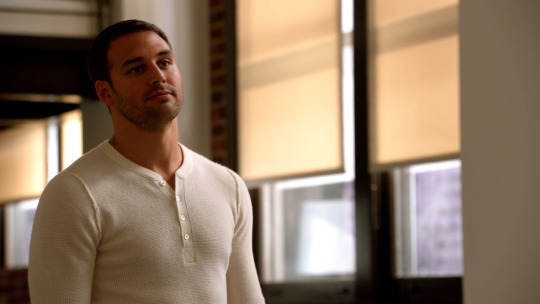
I personally think they are using white with Eddie for beginnings, in a sense. Eddie was always written as a widow archetype in mind, even when Shannon was still alive, so I think her funeral is a beginning for Eddie since her death defines his character. The tsunami is a beginning because it kickstart buddie the way we know it, he's is starting the arc that makes Buck his coparent. The outside looking in dinner kickstarts his breakdown arc. The scene with Kim kickstarts him deconstructing himself. The scene with Weston's dad is the start of Eddie's arc starting to figure out who he is. Is about beginning to change.
White is used for simplicity, purity, honesty, stuff like that. But I think they use the way they use it with Eddie is about the ending of a cycle and the beginning of the next, kinda like the way we use white for new years for example. It's a clean slate for Eddie to be built upon. And that pairs with my theory that Eddie is finding his yellow (you can read about that here), they are playing with lighter shades with him, until he figures himself out.
I will taglist this one (interact with this post if you wanna get tagged)
@sparkedblaze @caw-salem @dreamofsomepiphany @100ceruleaneyes @linus-lucy @chaosqueery @gina-spike @chimchiminie98 @elvensorceress @singitforthegirls @dangerpronebuddie @182daysof @steadfastsaturnsrings @sparklespiff @inell @miles--to--go @jesuisici33 @wolfdeans @lunarsolar1 @joshwritesfics @glasscities @kejfeblintz @stagefoureddiediaz @mosaicstardust @eddiedisasterdiaz @hermioneindisguise @queerprincesseddiediaz @lookforanewangle @becausebuckley @lemotmo @thenainitaldisaster @epiaphany @trudayss @shelfthe-reader @alliaskisthepossibilityoflove @buckgettingstruck @scoupsahoy @the-whispers-of-death @iced-coffee-jesus @izzysbeans
@dingdongfries @angelcamael
45 notes
·
View notes
Text
Draxum Redemption Arc and Relating it to Donnie’s Stadium Scene
I have been rewatching episodes of ROTTMNT.
I like Draxum’s redemption arc as it is in the finale. But I just wish that the writers had the time for more episodes to address it. They already have episodes where Mikey, Draxum, Raph, and Splinter talk to each other, which helps to establish his redemption arc. Though, the thing that I think would have helped to establish the redemption arc even further was if there was an episode where just Donnie, Leo, and Draxum were together as the main focus. This is mainly because Leo and Donnie both went through traumas related to Draxum that I think should have been addressed.
I can’t really say more than everyone else has said about Draxum dropping Leo from a roof. Yeah, maybe that really should have been addressed in the show.
So, I am going to be talking about Donnie and his traumas related to Draxum. Specifically, I want to address how Donnie got severely hurt by Draxum when Draxum was turned into Shredder!Draxum. And the traumas related to that.
To do this properly, I will be analyzing the episodes
End Game, specifically for the stadium scene to show how Shredder!Draxum severely hurt Donnie.
Then the beginning of Many Unhappy Returns in the stadium to show how Donnie was really scared of being hurt by Shredder!Demon
Analysis is below
End Game
So, obviously, with this episode, everyone got extremely hurt with Draxum being the Shredder.
But Donnie was hurt the worst by Shredder!Draxum than the rest of his family. One of my reasons is I don’t think his brothers were entangled in the squishy vines like he was. Here are the 3 pictures I am referring to. Time stamps for these are 16:55- 17:00.



Donnie’s whole body was encased by the vines, and the brothers had to try to save him. Obviously, it did not work, but still. In images one and three, Donnie looks like he is about to throw up.
Like that had to be sensory hell for Donnie. And he already has sensory issues naturally.
------------------------------------------------------
Then, at 18:03, Donnie was smashed down onto the ground by Shredder!Draxum’s now metal instead of squishy vines. He already looked like he had some kind of black eye with quite a few scratches.

------------------------------------------------------
But Donnie still continued to fight and was used as a distraction. Or, as Donnie said, “I will keep them recklessly busy.” He did this with his tech bo, and he is pretty brave.

Context: While Donnie was being used as a distraction, Raph smashed the seats in the stadium with his tonfas to cause the baseballs, seats, and any other materials to go into the air. Then, Mikey used his kusari-fundo to cut the seats, baseballs, and any other materials into tiny pieces. Finally, Leo used his sword to make multiple portals to aim the material at Shredder!Draxum.
------------------------------------------------------
In addition, because Donnie was used as the “reckless distraction,” he got pretty hurt while the other brothers were preparing all the materials they had in the stadium to throw at Shredder!Draxum. The next four pictures below show this during this part of the fight.
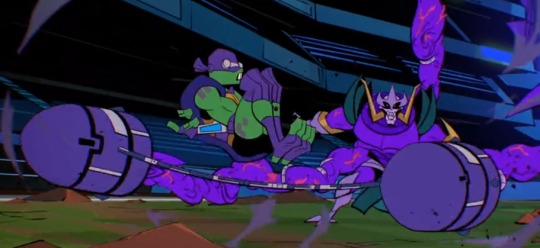



Donnie was trying his best to fight Shredder!Draxum with his tech bo, which he did somewhat efficiently. But the first image was the point where I could tell Donnie in his head was thinking, “This is scary.”
Then, in the second image, he was smashed to the ground by the squishy vines.
In image three, the squishy vines hit him in the back and shell, which looked very painful.
Finally, the fourth image shows that Donnie fought Shredder!Draxum until Leo comes in with his portals from multiple different directions, and Donnie looked more hurt compared to Leo. Only then does Donnie move away so the portals’ materials can all aim at Shredder!Draxum.
------------------------------------------------------
The next picture below shows how hurt Donnie got in the baseball stadium after he was no longer being used as a distraction and got out of the way. It really shows how hurt Donnie got compared to his brothers. For instance, he had a lot of bruises, and his face was swollen, but his brothers did not have any injuries like that.
Also, this kind of goes with a previous theory I have that they are all self-sacrificial that will be addressed at a later date.

------------------------------------------------------
The next few pictures emphasize that Donnie was the most severely hurt in this episode compared to his brothers even further.



The first photo shows that Donnie’s hand and wrist were hanging over Leo’s arm, so he is not able to high-five his brothers. What is important to mention is that April was the one who had to put Donnie’s hand and wrist on Leo’s arm for the high-five.
Then, the next two pictures are my biggest pieces of evidence that Donnie got severely hurt in this episode compared to his brothers. Specifically, because he was the only one who could not stand on his own. In the second photo, April and Mikey had to help Donnie stand up. This is when they thought they defeated Shredder!Draxum. And in the third image, April still needed to help Donnie stand up. That was the image just before the reveal of the full Shredder!Demon.
Ending conclusion
Take into account this all happened with just Shredder!Draxum. So, Donnie would have a bad feeling about Draxum being near him or anyone in his family at all. Also, I think Donnie would not be so welcoming to letting Draxum into the family. At least not without a conversation, and a deep one at that.
I really think that Draxum should have had an episode with just Donnie and Leo because of the dropping Leo from a roof and because of when Draxum was Shredder!Draxum in End Game caused Donnie to be severely hurt.
Also, I am headcanoning that Donnie’s sensory issues had increased after this event.
Many Unhappy Reminders episode line from Donnie I think that is important for extra notes I couldn’t figure out where else to put this is
“I want to say I feel prepared, but my chattering teeth won’t let me.”
Now, all I can think about was the fact that he was not able to stand by himself in a few scenes prior while the other brothers were able to walk.

This show really liked hurting Donnie, and I can tell. It does help me create great angst material. And I am adding more angst related to Shredder!Draxum in my fics.
#rottmnt#rottmnt donnie#rottmnt donatello#rottmnt leo#rise of the tmnt#rottmnt leonardo#rise of the teenage mutant ninja turtles#rottmnt michelangelo#rottmnt mikey#character analysis#rottmnt baron draxum#Catparent's headcanons and rambles
23 notes
·
View notes
Text
What I find hilarious about MCD: Rebirth is that Aphmau had the chance to make Aaron a character early on so he doesn't just come out of nowhere, do nothing, then fuck Aphmau and die. But instead, we meet Gene first like. Huh.
#minecraft diaries#mcd#aphmau#aphverse#minecraft diaries: rebirth#There is something hilarious that she didn't see anything (narratively) wrong with that and decided to keep it#tbf it was very very early on but considering we haven't even had the suggestion of one (1) Aaron I don't think he would be introduced#until the end of the first arc. /Maybe/ he was going to be in the werewolf tribe#Or a boy can hope and that he got scraped as a character or the final romance but I am pressing X on that one#Also tumblr randomly signed me out when writing this. My hate is too powerful or something
39 notes
·
View notes
Text
'Trapped in the end!' said Sam bitterly, his anger rising again above weariness and despair. 'Gnats in a net. May the curse of Faramir bite that Gollum and bite him quick!' 'That would not help us now,' said Frodo.
Sword in hand Sam went after him. For the moment he had forgotten everything else but the red fury in his brain and the desire to kill Gollum. But before he could overtake him, Gollum was gone. Then as the dark hole stood before him and the stench came out to meet him, like a clap of thunder the thought of Frodo and the monster smote upon Sam's mind.
Now he tried to find strength to tear himself away and go on a lonely journey – for vengeance. If once he could go, his anger would bear him down all the roads of the world, pursuing, until he had him at last: Gollum. Then Gollum would die in a corner. But that was not what he had set out to do. It would not be worth while to leave his master for that. It would not bring him back. Nothing would.
Sam and vengeance in today's entry
#idk i have Thoughts about this... rambles ahead...#there's an interesting arc here with how sam approaches his feelings of vengeance in this entry#starting with the first quote. frodo's response to sam is so brief and doesn't get much time to sit with all the action going on#but i feel like it speaks volumes#at least in showcasing the different points they stand on#sam centers his resentment and feelings of revenge... he's quick to get frustrated and immediately goes for threatening gollum#meanwhile frodo is focused on getting out. he doesn't have time to nurse anger nor does he want to#it feels like he's advising sam to move past it because he knows it's futile to stay stuck in those feelings#then there's sam's fight with gollum#after days and weeks of building tension from his mistrust towards gollum... this is where the dam finally breaks#sam's been feeding into his resentment for SO LONG it's no wonder he gets into this state of blind fury towards the end#he set himself up to seek vengeance the moment he gets the opportunity#which in some way i'm sure does help him in fending off gollum... that strength had to come from somewhere#but once he's staved him off he continues to fixate that anger on gollum and forgets what he originally set out to do-- protect frodo#and then we're left with the final quote...#it isn't until sam has (perceived to have) lost everything that he is able to come to the conclusion that vengeance won't serve him#...a lesson learned a little too late?? maybe?? no?? it feels cruel to say that#i definitely do not want to take the position that sam was responsible for what happened to frodo#he was pinned in a horribly desperate situation and couldn't do much once gollum attacked#i don't think much would've changed if he hadn't had his moment of fury with chasing gollum#anyways newbie here-- i haven't read anything ahead from here so idk what character arcs await sam#but i'm interested to see if this is later built upon or acknowledged#end of rambles skdfjgkdjsfg#lotr newsletter#lotr newsletter march 13th#EDIT: I forgot to space the quotes out 😭#not a crime but they can get confusing to read when scrunched together hrnnnn
13 notes
·
View notes
Text
Atsushi's back in the game!!! ۶( ˆ o ˆ )
#And Kouyou!!!!#Also. I can say Steinbeck is kinda 👀👀👀#King of the specific category of “I forget I like him until he's on screen”#I'm seriously unlocking memories with this rewatch. Like I haven't thought about it in two years–#but I just know when I was watching the anime for the first time I was being like#“Of COURSE the villains need to spend several minutes each episode explaining in detail how their own superpowers work so that the–#protagonists can get a perfect idea of how to best counter them. Why are villains made so freaking stupid in this show” aljhvwslchvqliyqwb#But. Eh. I guess that's just bsd to you.#Alsoooooo random thought of the day: I don't really favour how Tanizaki's ability was adapted in the anime.#I very well understand they were going for this green Matrix-like illusion effect‚ but every time someone says “... Snow?”#I'm like please explain where do you live that has snow glowing green.#Aamsjgvfaskjhfv sorry this is me being very. Cranky and nitpicky and having terrible audience etiquette in refusing to–#engage in suspension of disbelief. It just bugs me akvakcvqkyb I just feel like... Green is such a non-snow color–#that quite of completely disrupts the Light Snow / Sasame Yuki aesthetic. I would have liked it much better light blue or simply white.#What else. The way the Guild just goes on at stereotypes still troubles me a lot. The “usamericans can't be touched by laws–#because they use money to corrupt anyone” “foreign criminal organization come in our country to corrupt our pure and untouched soil”#Idk. Maybe all of it is true. Can it still be deemed a stereotype when it's objectively something that's happened before–#and will probably keep happening?#I suppose I'm just not a fan of the constant hostility against any foreigner. Idk.#This situation besides is extremely ironical. If you meet me irl it probably won't take long to see me being very outspoken about–#how much I despise usa cultural colonization of all other countries. It's something that really bothers me‚ how rooted and pervasive–#their influence is. So in a lot of ways I can relate to the author's sentiment#I just feel that. If you start treating them as stereotypes and ignore the complexity of a country and the wide spectrum of causes–#that contribute to its attitude in international relations. You end up practicing precisely what you're trying to criticize.#Okay this is the last time I'm getting into the politics of the Guild arc lol#random rambles#This time I took watching the episode slow I feel a little late
10 notes
·
View notes
Text
not my dad not liking moral orel season 3 🤭🤭🤭that's so embarrassing for him (<- he's not wrong for feeling that way but i think it's like 60% because he doesn't like it when art gets weird and that's so so tragic for him)
#i actually think his points make sense this time. which tbqh is not normally how i feel when he criticizes smth i love#basically he was like s3 was a completely different show from the first two seasons#and he didn't like how all over the place and directionless it felt#and honestly yeah ok i can see that#personally i think the choice to broaden the focus to moralton broadly vs mostly just orel is really interesting#and it allows for different facets of their critique of fundie waspisms to extend to situations/characters orel wouldn't really be privy to#(could you imagine 'alone' with orel there? me neither)#and i personally liked them fleshing out the marginal characters. i never found that boring or like a major diversion#again they're like 11 min episodic(ish) things it's hard for them to feel like they drag on y'know#it shows a lot of ambition and i think they pulled it off really well tbh (cancellation aside)#but i will agree that the transition is a little sudden. nature is such a big moment for the series#and for orel's arc specifically but then we spend little time with orel post-nature so the tone shift doesn't#necessarily align with his realization (at least in terms of the canon timeline. ep release order does align)#it's sudden but we jump back to before the shattering. it's disorienting and i think it's kind of cool as hell#a realization like orel's in nature is gonna throw the past into question and color his life and thus the town#(bc let's face it orel is the real mayor of moralton kfhsjs) and while we've been seeing Some of moralton's ugliness#in every episode until now it's shown in full force in and post-nature (release-wise). so when the timeline jumps around#and it all feels twisted and hazy and sickening and it All Comes Back To The Hunting Trip as our point of reference#for when things are happening it makes it feel like the trip Caused this disturbance. it's almost a spatio-temporal THING#like orel IS the center of this universe. my point is it's weird and i like it a lot i think it works#but anyway i think s3 is a natural evolution of s1+2 albeit an accelerated one#and i really wish we'd gotten to see more of what s3 morel was cooking bc it was setting up some really cool stuff imo#like he hated everything w mommy censordoll x clay but it's SUCH a cool place to take their characters. freud would go crazy#moral orel#and i think if they knew where they had to end the season maybe focusing on other characters was a way to keep orel stagnant enough to like#end the finale where they needed him. maybe.#we actually DID finish it yesterday. i rewatched the finale the day before bc i was impatient but yeah 👍#now it's chapter black time >:}
4 notes
·
View notes
Text
there's another post i want to make, eventually, about what i feel is the most overarching theme in slayers -- and it's such a simple yet broad theme that it feels difficult to explain or articulate anything about, but... there's such an emphasis on being alive, and continuing to live no matter what. the mazoku, by nature, exist in direct opposition to this mentality (though it's not so clear cut as that), making them perfectly suited to be the ideological opponents of lina and co
#it clicked with me first in that scene with milgazia#where lina's basically like. gaav may have a good reason to want to kill me after all#but still i want to live#and milgazia's like you know what. fair.#that is reason enough to fight#and then in retrospect the copy rezo arc had some elements along those lines and i was going#hmmmmmhmhmhm#i see something here#living on your own terms#living even to the detriment of others#copy rezo being unable to live until he can surpass the original rezo#lina risking the giga slave in order to stay alive#there's nothing cut and dry about it - destruction is also not an inherently bad thing#but nuance only makes it more interesting i would say#maybe my thesis would end up more along the lines of...#it's understandable that people would do whatever they can to live their lives to the fullest#you can't condemn that desire wholesale even when the methods themselves are worthy of condemnation#/gestures at rezo's very Interesting morality#if this meta sucks i choose to blame it on my current illness
2 notes
·
View notes
Text
this is such a small moment, and I totally missed it the last time I read this chapter, but

if I had a nickel for every time Wen Ning went out of his way to save Jiang Cheng and got kicked in response, I would have two nickels, which isn't a lot, but it's kinda funny that it happened twice
#wen ning#jiang cheng#mdzs#disclaimer: i am a jc apologist hes my meow meow don't fight me#it's just curious#something something wen ning saving jiang cheng again and again even though jiang cheng hates him with a passion#and wen ning himself has plenty of reasons to hate him#except he just... doesn't? or maybe it's just another negative feeling that he decided to repress until the end of his existence#aside from the golden core drama he either delicately avoids jiang cheng or tries to help#and i still maintain that the biggest wen ning character moment isn't him going ham at jiang cheng#it's him shielding jiang cheng with his body the next day#(you can argue that he did it for jin ling but a) it can be both and b) jc was already shielding jin ling with his body)#(and jin ling's safety is more important to jiang cheng anyway)#jiang cheng's reaction to that was priceless tbh#like yeah the kindest man in the world first decided to end your whole career and then saved your life again. like what do you even do#special thanks to wang zhuocheng for acting this scene in cql#that facial expression was a+#anyway i hope they enjoy bumping into each other while chaperoning juniors on night hunts bc i need this enemies to begrudging allies arc#if nobody got me mdzs q ep 26 got me
8 notes
·
View notes
Text
call me crazy but feel like rog does remember his and v’s anniversary. did he do anything, ever, for his and laura’s, other than toasting burke in prison (by himself)? no he did not. could he tell you her birthday after ten years of marriage? probably not. however. v melts into an absolute puddle even if he does the barest possible minimum on her birthday / anniversaries / etc. ditches work to stay with her and surprise her with flowers. wakes her up with smooches & breakfast in bed ( he did not make it he's just delivering ). anniversaries they'd definitely take off to boston or new york for the weekend, birthdays though she'd want to spend at home. not for a party oh god forbid but just to be surrounded by family, maybe some time out on the boat, a little séancing to hang out with her ghost besties too.
not to be all "she was born in a wet cardboard box all alone" but having hard dates to celebrate, and feeling really loved on the birthday she has, the real anniversary she has, is soooo important to her. she needs those tangible markers to hold onto. and it's not like taking his pretty little wife out dancing is a chore, either.
#➤ roger collins & victoria winters. ┊ pain sometimes precedes pleasure,miss winters.#➤ arc: mrs. collins. ┊ collinwood will always mean home to me.#they don't rlly have ... a hard ''this is official'' going together date in my view.#i do think they had their first kiss in london because i'm an incurable romantic. so if there was a date they'd use maybe that.#probably somewhere horribly morbid but also beautiful like the tower of london.#but it wasn't a grand gesture or a hard line between platonic/romantic in their relationship. like it happened. and they were both .... oh.#but they did not discuss it and it wasn't until after they got back that things got more Serious.#for one thing she's still hardcore recovering from jeff / from her own suicide attempt during that month (?)#(i should really check to see how long he was actually there)#and the last thing he'd want to do is make her feel like he was taking advantage of her.#not to baby-boy-ify him but. his first marriage where he's actually truly loved and loves in return (no witchcraft involved)#so he's really seeing it for the third time but also anew. and this is her first marriage/engagement that didn't Immediately end in tragedy#they Will be happy. damn it!
3 notes
·
View notes
Text
I wonder how many of Armand's victims have actively fought back during his "easeful death" speech the way Daniel did.
Daniel's interruptions may be small — not loud or flailing or aggressive — but they're impactful. And while Armand remains composed throughout and continues his practiced monologue without wavering, I'd say for the first three quarters of it he's talking at Daniel. He talks over him, but not really to him. Not until the very end.
Daniel rebuts with:
"I don't want to rest."
"I like my life."
"I have a thing happening in the city."
"I'm a bright young reporter with a point of view."
He's trying so hard to cling onto life. He doesn't want death, even if it is an easeful one. Armand cuts that last interjection off with a "ssh-ssh-ssh," which makes me think this might be a point where Armand's patience is tested. Because things aren't going the way they perhaps normally go when he gives this speech! Daniel isn't begging for death! He's resisting!
And so then, Armand says "rest" a lot near the end of the speech, which we know by this point is an indicator of him controlling bodies. He says, "It's okay, it's okay, it's okay. It'll feel like a bath. Rest. Like honey on your tongue," etc, and maybe this is Armand struggling and fighting harder to get Daniel into the state of obeisance that he wants in his victims. The speech hasn't been working as intended, so he has to rely more on his methods of control and hypnosis.
And finally, after all this, you can see the moment when Daniel finally falls into the trance. It's after a lot of effort on Armand's part, and after he's resorted to his cheaper tricks.
So, if we do get a past Devil's Minion arc, I can see Armand fixating on the fact that Daniel was able to resist the pull and performance of Gentleman Death for an impressive amount of time. That despite all the words Armand said to him, he still longed for life.
Maybe this is what makes him fascinating.
#my ramblings#iwtv s2 e5#amc iwtv#interview with the vampire#daniel molloy#the vampire armand#iwtv#iwtv s2 spoilers#amc iwtv s2 ep 5#iwtv analysis#armand x daniel#devil's minion
861 notes
·
View notes
Text
So many thoughts on the fabulous Barbie film, but especially on how anyone who thinks it’s “hateful towards men” clearly isn’t getting the message.
SPOILERS UNDER THE CUT
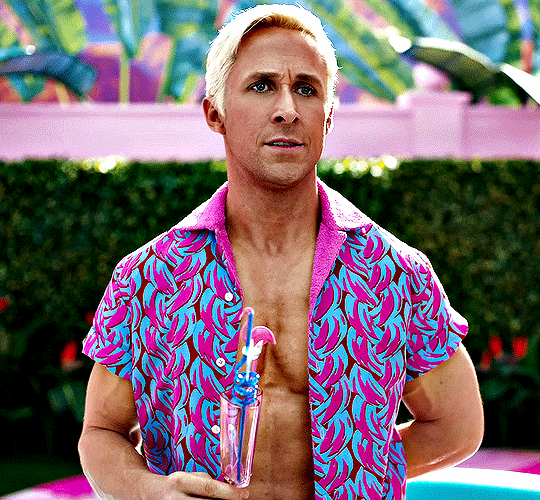
[Credit for both gifs goes to their makers!!]
I mean... Ken’s arc is secondary to Barbie’s, and rightly so. This is her film, and her message deserves to be the main takeaway.
That being said, I just find it really sad that the people who could’ve definitely used the point of Ken’s arc just let it go right over their heads. Maybe it’s because they aren’t great at reading subtext, or because they just balk at anything presented as feminist, I don’t know.
Because to me, Ken’s arc is about as far from “hateful towards men” as you can get. It’s a multi-layered depiction of how restrictive, outdated views of masculinity can hold men back and make them susceptible to harmful ideologies that promise easy solutions for all their problems but only make those problems worse and hurt others around them.
The first layer is an allegory for real men don’t show their feelings. In the movie, this is represented by Ken’s need to look tough and cool all the time, and to keep his insecurities and sadness bottled up. Barbieland is a utopia where being happy is a social norm, and the main Barbie also starts to struggle with that. The difference is that she eventually tells her friends, and they all support her. Ken just puts pressure on himself not to look weak - in front of Barbie, or in front of the other Kens.
Which brings us to the second level: a competitive and inherently hostile view of the other Kens, aka. toxic male relationships. Some of them are friends, and all of them work together for a while to build the Patriarchy, but they don’t actually bond for real. Even their boys’ nights are mainly about getting back at the Barbies for all their girls’ nights (which really were about bonding). When push comes to shove, the Kens still see each other as competition, which is one of the reasons why the Barbies are able to play them against each other.
Another reason is the third layer: the idea that Ken only has value if Barbie loves and admires him. It starts out as unrequited love that makes you feel sorry for him...until he turns bitter. He basically starts on the path that could lead him down the incel/mra rabbit hole and into a mindset where Barbie owes him love and admiration and the relationship he wants in exchange for his devotion to her. He decides that everything would be better if Barbies were subservient to Kens, but of course that’s not true. None of the Barbies’ newfound admiration for their Kens is real, and his own Barbie still rejects him.
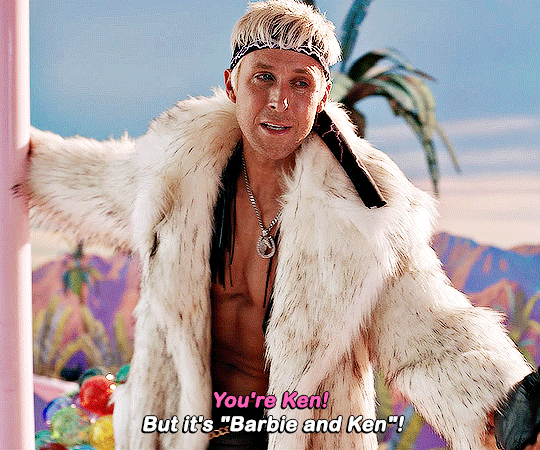
All this is of course underpinned by the final layer, which is Ken’s lack of self-respect and sense of purpose. He’s got a pointless job, he’s not particularly qualified for anything, and he just feels kind of lost in Barbieland - a society run by successful Barbies who are living up to their full potential. That’s why he gets so caught up in the idea of the Patriarchy, which is supposed to make him successful, get others to respect him, and give him a sense of purpose. (This can be generalised to all kinds of harmful ideologies in the real world, e.g. the alt-right movement.)
However, the success he achieves is superficial and not based on any real passion; he even admits that he wasn’t happy in his new position and already lost interest in the ideology. The (forced) respect of others does feel good for a while, but it only goes so far. At heart, the whole thing is still mostly about his feelings of inferiority and unrequited love for Barbie, and instituting this harmful new system did not resolve those for him.
So what does? In essence, breaking out of all these harmful patterns and internalising the idea that he is enough.
He ends up reflecting on his feelings, finally puts them to words (or rather, song and dance), and manages to connect with the other Kens through those feelings. He even cries in relief and acknowledges that it doesn’t make him weak. He and Barbie finally have a proper talk, he lets go of their (non-)relationship, and he listens when she says he needs to figure out his real self. He starts to see himself not through his job, his girlfriend, or even his competition with the other Kens, but as just Ken, who is enough.
I honestly can’t think of a less hateful message to send men and boys.
#barbie spoilers#barbie movie spoilers#barbie 2023 spoilers#barbie movie#barbie 2023#barbie meta#greta gerwig#barbie#ken#and of course the perfect ken#ryan gosling#he is kenough
4K notes
·
View notes
Text
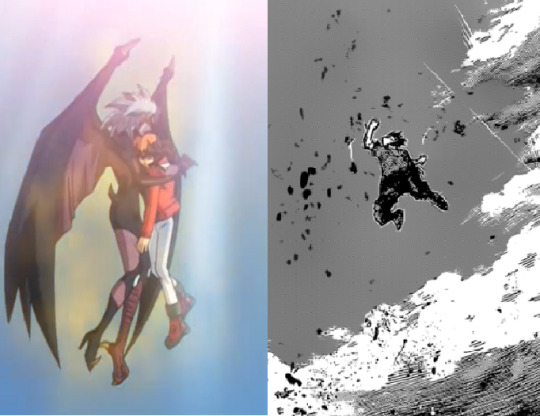
SHIGARAKI VS. YUBEL: HOW TO SAVE YOUR VILLAIN
The failure of Deku to save Shigaraki isn’t just a tragic conclusion for Shigaraki’s arc, it’s also My Hero Academia failing as a story. When I say the story failed, I mean the story has failed to answer any of the questions it asked its audience. It’s themes, character arcs, everything that communicates the meaning of the story to the audience is no longer clear.
Saving Shigaraki was the central goal of not only the story itself, but the main character Deku. By failing in its goal you can’t call this a good ending. In order to illustrate why this goal of saving the villain is so important to both Deku’s character and the central idea of MHA, I’m going to provide a positive example in Yu-Gi-Oh GX were the main character Judai successfully saves their villain. One of these stories fails, and the other succeeds. I will illustrate why under the cut.
BROKEN THEMES = BROKEN STORY
When artists draw they have to consider things like perspective, anatomy, shading, light, coloring. Drawing has rules, and it’s hard to produce good art without knowing these rules beforehand. If I draw something that has bad anatomy, you can criticize me for that.
Writing has rules, just like drawing. The rules of storytelling are important because writing is an act of communication. You can write whatever you want, just like how you can draw whatever you want, but if you break the rules the audience won’t understand what you are trying to communicate.
When I refer to MHA as a broken story, I am referring to the fact that it has broken the rules of storytelling. As this youtuber explains.
“I guess we should first define what broke and broken even means in this context. Has the story turned into an unintelligible mess? Not really. Value judgements aside, the narrative is still functional and fulfills the criteria of being a story. So how can a story that still functions be broken? Maybe to you it cannot. But to me a story that is still functional isn’t enough. What I mean when I say MHA is broken is that it’s lost something crucial. A codifying style of structure, pacing and payoff that until a certain point was the core of its identity.”
I could launch into a long-winded explanation of what themes are, but for the sake of simplicity I like to define themes in terms of “Ask, and answer.” The author asks a question to the audience, and then by the end of the story provides an answer. The audience is also invited to come up with their own answer which prompts them to think about the story on a deeper level. The question both MHA and GX are asking both its main characters and the audience is “Can you save the villain?” with the additional complicated question of “Should you save the villain?” This post will detail how both stories go about answering those two questions, and more importantly why those answers matter for the story.
With Great Power… You know the rest.
My Hero Academia and Yu-Gi-Oh Gx are actually similar stories once you get past their superficial differences. MHA is a story with way better worldbuilding, compared to a society where everything revolves around the trading card game, and people go to school to be better at a trading card game.
However, if you get past that. They are both bildungsroman, stories about the main characters growing up into adults. They both have an academy setting where the goal is for the main character to graduate and enter the adult world. They are both shonen manga. GX is the sequel of Yu-Gi-Oh a manga that ran in Shonen Jump the exact same magazine as MHA. The biggest point of comparison is their main characters, who both start out as young and naive who are driven by their admiration of heroes. Deku is a fan of All Might who wants to become a hero despite not having a quirk, because he loves All might who saves everyone with a smile. Judai’s entire deck archetype revolves around “Elemental Heroes’ and later “Neo-Spacians” who are all based on popular sentai heroes like ultraman.
The central arc for both characters is to grow up. Growing up for both of them not only requires figuring out what kind of adult they want to be, but also what kind of hero they want to be.
Now I’m going to drastically oversimplify what a character arc is.
A character arc first starts out with the character being wrong. Being wrong is essential because if the character is right from the beginning, then there’s no point in telling the story. A character often holds the wrong idea about the world, or has some sort of flaw that hinders their growth. The narrative then needs to challenge them on that flaw. It usually sets up some kind of goal or win condition. That flaw gets in the way of a character “winning” or achieving their goal, so they need to fix that flaw first. If their ideals are wrong, then they need to think about what the right ideals are. If they’re too childish, they need to grow up. If they have unhealthy behaviors or coping mechanisms, they need to unlearn it and require better ones. Otherwise, that flaw will keep sabotaging them until the end.
I’m borrowing the word “win condition” from class1akids here because it’s an incredibly appropriate terminology. Midoriya needs to do “x” in order to win, otherwise this victory doesn’t feel earned. The “x” in this case is usually character development. As I said before, a story where the main character hasn’t changed from beginning to end feels pointless. Especially in Deku’s case, he was already a brave, strong hero who would charge right into battle and defeat the bad guys in chapter one, so him defeating Shigaraki in a fist fight doesn’t represent a change.
The story sets up not only “What does the hero need to do to win?” but also “How does the hero need to change in order to win?” A character either meets these requirements before the end of the story, or they don’t and usually this results in a negative ending.
MHA in its first half quite clearly set up both the final conflict of saving the villains, and also that saving the villains is its “win conditions.” The hero shouldn't be allowed to win without first fixing this flaw.
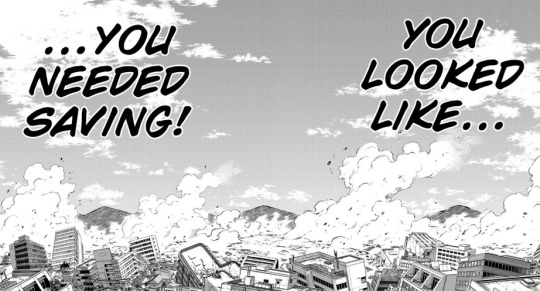
From this panel onward the central question Deku is forced to answer shifts from “Am I strong enough to defeat ShigarakI” to “Can I save Shigaraki?” However, much earlier than that All Might goes on to basically set up the win conditions of what makes the ultimate hero as someone who “Saves by winning, and wins by saving.”
All might: You can become the ultimate heroes. Ones who save by winning, and win by saving.
Therefore the story has set it’s criteria for what kind of hero Deku needs to become. If he wins without saving, then he’s failed to become what the series has set up as the Ultimate Hero.
Shigaraki and Yubel aren’t just narrative obstacles, or boss monsters to be killed like in a video game. They are narrative challenges, which means that the character can’t grow in any way if they don’t answer the challenge presented by the characters. They are villains who actively resist being saved, to provide a challenge for two heroes who define their heroism by saving others. The challenge they pose adds a third question to the story and the main characters.
"Can I save the villain?"
"Should I save the villain?"
"If I don't save the villain, then can I really call myself a hero?"
In other words the decision they make in saving, or not saving their final antagonist defines what kind of hero they are. In Deku’s case it’s even more critical he defines what hero he wants to be because the MHA is also a generational story, and several of the kids are asked to prove how exactly this generation of heroes is going to surpass the last one. The kids growing physically stronger than the last generation isn’t a satisfactory answer, Deku getting strong enough to punch Shigaraki hard is not a satisfactory answer, because we are reading a story and not watching a boxing match.
I’m going to focus on the last two questions though for a moment. Many people who argue against saving villains like Shigaraki argue he is a mass murderer and therefore isn’t worthy of salvation. However, the act of saving Shigaraki isn’t a reflection of Shigaraki himself, but rather the kind of hero Deku wants to be. It all boils down to Spiderman. In the opening issue of Spiderman, teenage Peter Parker is bitten by a radioactive spider and suddenly gains super strength, the ability to stick to walls along with other powers. However, being a teenager he uses these powers selfishly at first. He doesn’t feel the obligation to use his powers for other people, and therefore when he sees a robbery happening right in front of him he lets the robber go. However, because he lets the robber go, the robber then attempts to hijack a car and kills his Uncle Ben in the process. If Spiderman had stopped the robber then he might have prevented that from happening. He had the power to stop the robber, but he didn’t feel responsible or obligated to save other people. As a result Uncle Ben dies. It’s not enough to have power, ti’s how you use that power that reflects who you are, therefore: “with great power comes great responsibility.”
The choice to save Shigaraki actually has little to do with whether or not Shigaraki is redeemable, but rather how Deku chooses to use his power, and what he thinks he is responsible for reflects who Deku is as a person. Deku himself also clearly outlines how he wants to use his power, that One for All is a power for saving, and not killing.
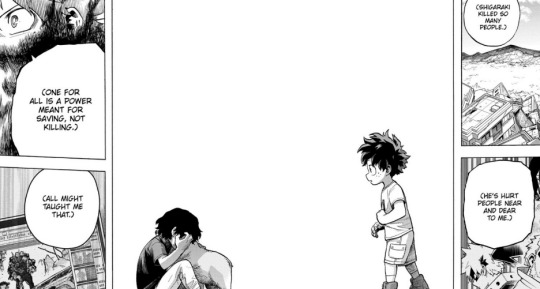
How he uses his power reflects Deku’s ideal in saving others, and therefore if he doesnt use his power to save, then he’s failed to live up to his ideals. It's not whether it's morally right to save a murderer like Shigaraki, but rather the way Deku wants to choose to use his power. It's about whether he feels the responsibility to save others.
Judai explores an incredibly similar arc to Deku. They are basically both asked what kind of responsibilities a hero is supposed to have, which is also a metaphor for growing up to handle the responsibilities of adulthood. As both characters start out with incredibly naive and childish ideas about what a hero is. Therefore realizing what a hero is responsible for is key to them growing as a character. However, Judai is different from Deku. In some ways he’s more like Bakugo. Judai is a prodigy who’s naturally good at dueling. He doesn’t duel to save others, but rather because duels are fun and he’s good at it. He’s very much like Bakugo, who admired All Might as a hero just as much as Deku did, but admired the fact that he was strong and always won rather than he saved others.
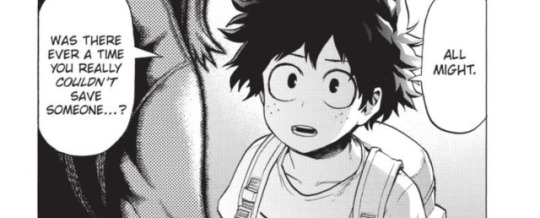
However, I would say both Deku and Judai are questioning what a hero is responsible for. They are both asking if they have the responsibility to use their power to save others. If they have to fight for other people, just because they have power. His first big challenge as a character comes from Edo Phoenix, who calls out Judai for not thinking through what it means to be a hero, and what responsibilities heroes carry. Judai duels because he thinks it’s fun. He will show up to duel to help his friends, but that’s because he’s the most powerful person in the group. Even then it’s because he finds fighting strong opponents to be enjoyable. Bakugo will beat up a villain, but for him it’s more about winning then if the action will save someone or not.
Judai is more often than not pushed into the role of being a hero, he doesn’t play the hero because he’s a particularly selfless person, and he’ll often avoid responsibility if not forced. He has power but no sense of responsibility and the narrative calls them out as a problem.
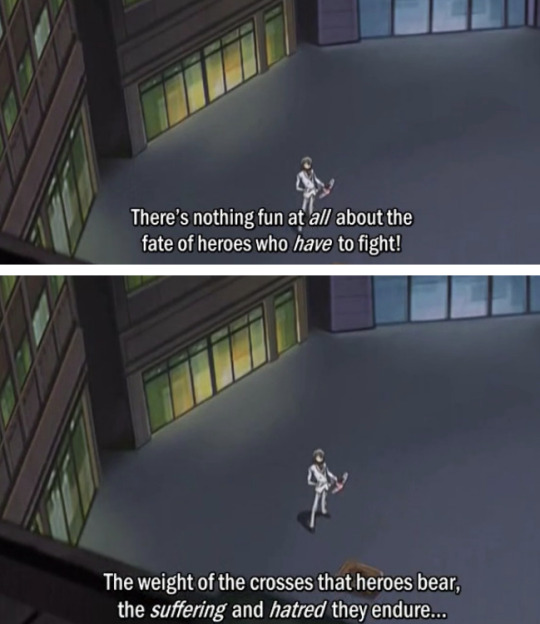
Edo: Can you even fathom that, Judai?
For Judai, he can’t understand the responsibility of being a hero. For Deku, he idealizes heroes so much he can’t understand that there are people out there the heroes have failed to save. These two callouts towards Deku and Judai are discussing similar because they’re both discussing where a hero’s responsibilities lie. Is a hero responsible for saving everyone? Is someone strong like Judai responsible for using their strength to help other people?
Judai’s arc continues into the third season where he’s not shown to just be naive but ignorant. He’s not just childish, he actively resists growing up because he doesn’t want to take on adult responsibilities.
THe same way that Deku just decides not to think about whether or not All Might failed to save people in the panels above. However, in Judai's case he's actively called out for his choice to remain ignorant.
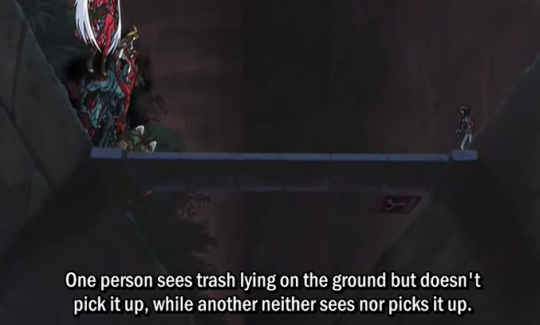
Satou: Now, which one is at fault? Judai: Isn’t it the guy who saw it, but didn’t pick it up. Satou: Not quite. If one is aware of the trash that fell, it may be picked up someday. But there is no possibility fo the unaware one ever picking it up. Judai-kun you are the foolish one unaware of the trash that has fallen. Judai: Are you calling me out for how I am? Satou: Your behavior towards me was atrocious. The worst was attending class only for credit, even if you were there you only slept. Judai: Yeah, I know. I was all bad, but it wasn’t that big a- Satou: It is important. You see, one by one, the students inspired by your attitude were losing their motivation. Now if you were a mediocre duelist, then this would not be an issue. Satou: However, you are the same hero who defeated the three mythic demons. Every single student in the academy admires you. You should have been a model for this academy. Judai: Me, a role model? Are you kidding? I just do whatever I feel like doing. Satou: Great power comes with great responsibility. Yet, as you remain unaware of that, you’ve spread your lethargy and self-indulgence.
seems like a minor issue, but look how Judai responds to the accusations. “I just do whatever I feel like doing.” Satou is arguing that Judai should pay attention to the influence he has on others because of his power, because how he chooses to use that power affects others. However, Judai chooses to actively not look at the consequences of his actions because he doesn’t want to take on that level of responsibility, and therefore he’s looking away from the trash.
While it seems like it doesn’t matter in Satou’s specific example, not thinking of the consequences, or how you use your power can have unexpected consequences. Spiderman doesn’t feel like it’s his responsibility to stop a bank robber, and that bank robber shoots his uncle. You could still argue it’s not Spiderman’s responsibility to stop every crime in the world, and I guess no one owes anyone anything from that point of view - but Spiderman failing to act responsibility had the consequence of directly hurting someone else.
Spiderman has to live with that consequence because it was his own Uncle that was hurt. This is where we really reach the duality of Judai.
In GX, Judai is, symbolically speaking, The Fool of the Tarot Deck, the Novice Alchemist — a person brimming with infinite potential, yet one who is also supremely ignorant, who walks forward with his eyes closed and often unknowingly causes harm in his great ignorance. In this, he is very much the embodiment of the faults we most commonly associate with teenagers — selfishness, recklessness, shallowness, a lack of dedication or empathy when it’s most needed. Like most people, he has good traits that work to balance out some of the above, but his narrative path through GX ends up being that of the flawed hero undone by his faults — and then that of the atoner, the repentant sinner. In his case, the mistakes of his teenage years are the catalyst for his growth from a boy into a man burdened with duty and purpose. Judai is someone with infinite potential, with great power, but also ignorant on how he should use that power, and that makes him an incredibly flawed hero who needs to learn how that power should be used.
Deku similarly exists in a society where heroes deliberately turn a blind eye to the suffering of a certain type of victim. Shigaraki’s speech heavily resmebles Satou’s speech about garbage on the side of the road.
Shigarali: "For generations you pretended not to see those you coudln't protect and swept their pain under the rug. It's tainted everything you've built."
Deku shares Judai’s ignorance, because he’s not only a part of a system that doesn’t even see trash on the side of the road, but he also worships heroes so much that he’s incapable of criticizing them. If Deku saw the flaws of heroes, but at first didn’t have the courage to speak out, but eventually gained the courage that would be one thing. However, if he doesn’t see the flaws of heroes, then the problem will never be fixed.
There are also consequences for both Judai and Deku failing to use their powers responsibly. These consequences take the form of the villains who came about because of all of society’s ignorance to the suffering of victims (Shigaraki) and because of the main character’s ignorance to their suffering (Yubel). Shigaraki and Yubel are also explicitly victims that the heroes failed to save, turned into villains who are active threats to the heroes.
Should I save the villain?
The answer is yes, because the decision to save is reflective of the kind of hero each character wants to be. Each story clearly sets up that Deku and Judai aren’t punisher style heroes who shoot their villains, they are being set up as heroes who save. Deku needs to “save by winning.” As for Judai, a big deal is made of Judai’s admiration for another character Johan who represents a more idealistic kind of hero. Johan unlike Judai is someone who duels with a purpose, something Judai outright says he admires because he’s empty in comparison.
Judai: Johan what have you been dueling for? See, it’s about fun for me… Well, for the surprise and happiness too. I guess I do do it for the fun. Sorry, I guess I put you on the spot by asking out of nowhere. Johan: What’s this about Judai? Judai: It’s nothing. Johan: I suppose there is one goal I have. Johan: Even if someone doesn’t have the power to see spirits, they can still form a bond with a spirit. That’s why I do it for people like him. [...] Johan: I'll fight for everyone who believes in me, and I'll do it with my Duel Monsters. Judai: I'm jealous you've got feelings like those in you.
Becoming a hero who uses their power to help others isn’t just a goal the story sets for Judai, it’s a goal that Judai sets for himself because of his admiration for Johan. Johan represents the idealistic hero Judai wants to be, but is also held back from because of his personality flaws. Johan represents the kind of heroic ideal that Deku is aspiring to be.
Johan’s ultimate goal isn’t punishing the wicked, but to use his power to save others.
Johan: Judai, it was my dream to save everyone through my dueling!
The story sets up the idea that it’s not enough for Judai to simply be strong, he’s also challenged to become a savior who uses his power to help others like Johan. Deku needs to “save by winning” and Judai needs to “Save everyone through his dueling.” However, Johan also adds another condition to what saving means. His idea of saving isn’t to defeat a villain, but rather his dream is to help connect spirits and humans together, even if there are humans who can’t see spirits. Johan doesn’t save people with the power of physical force, but rather the power of human connection.
Should I save the villain?
Here the answer is "Yes", because wants to become more like Johan someone who uses their power to help others not just for themselves. Then we reach the third question
If I don't save the villain, can I really call myself a hero?
It once again comes to power and responsibility. Heroes have great power, and they are responsible in how they use that power, if they use it irresponsibly then there are consequences. Shigaraki wants to destroy hero society, because the heroes irresponsibly use their power to turn a blind eye to everyone’s suffering.
People suffer when heroes fail to live up to their responsibilities. The entire conflict of season 3 is created by Judai failing to save Yubel. If Judai had helped Yubel when they most needed it, instead of abandoning them, then Yubel would never have been twisted by the light of destruction, would never have attempted to teleport the school to another dimension, would never have attacked all of JUdai’s friends.
These consequences matter. Deku can turn his eyes away from Shigaraki’s suffering, but let’s say a hero failed to stop a robbery, or rather he didn’t even try, and because of that his mom was shot and died in the street. Would Deku consider the man who failed to stop a bank robbery a hero? When Spiderman let a bank robber go instead of trying to stop him, was he being a hero in that moment? Both the stories and the characters themselves have defined heroes as people who use their powers to save others, therefore if Judai and Yubel fail to save their villains then they can’t be called heroes by the story’s own definition. Now let’s finally return to the question of "Can I save the villain?"
Was there ever someone you couldn’t save?
m going to start with Yu-Gi-Oh Gx as a positive example of how to save your villain. Gx works for two reasons. One, it’s established from the start that Yubel isn’t beyond salvation, and two, it makes it so Judai can’t win without saving Yubel. The conflict of the story does not end until Judai makes the decision to save Yubel. In some ways the writing is even stronger because Judai is directly responsible for the pain and suffering that Yubel went through that turned them into a villain in the first place. Yubel isn’t just a victim, they’re specifically Judai’s victim.
Yubel is a duel spirit who is also essentially Judai’s childhood friend. A duel spirit just like the kind that Johan wants to save. During their childhood Yubel got too overprotective of Judai, and started to curse his friends for making him cry or upsetting him in any way. Until everyone Judai’s age started avoiding him and Judai became all alone with only Yubel for company. Judai’s decision was to abandon Yubel at that time. He took the yubel card and shot them into space, hoping that being bathed in space rays will somehow “fix” what was wrong with them. I know that’s silly but just go with it. Judai abandoning Yubel had the unintended consequence of Yubel being subjected to the light of destruction, a corrupting light that subjected Yubel to years of pain. This pain literally takes the form of Yubel burning alive.
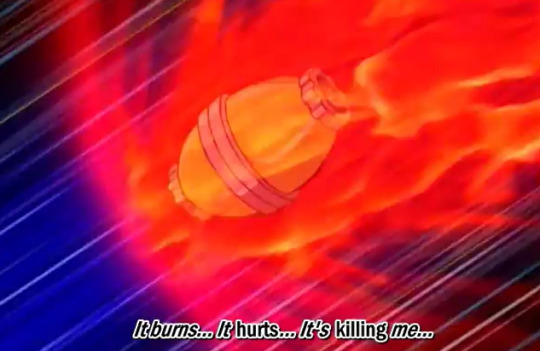
Yubel connected to his dreams called out for Judai every night, only for Judai’s parents to give him surgery that repressed his memories of Yubel causing him to forget them entirely. Yubel then spent the next ten years alone in space, continuously subjected to painful torture, with their cries for help being ignored.
"I was suffering even as you came to forget about me..."
Yubel is then met with the question of how can Judai treat them this way if they loved him so much? As from Yubel’s perspective, they’ve only ever tried to protect Judai, only for Judai to not only throw them away, but subject them to painful torture and ignore their cries for help. Judai effectively moves on with his life, goes to duel academy, makes friends while Yubel is left to suffer in silence all but forgotten. This is where Judai’s ignorance has serious plot consequences.
It’s not just the pain that Yubel endured that made them snap. It’s that their pain went ignored.
Yubel holds out the faint hope that Judai will answer their calls fro help until they finally burn up upon re-entry into earth’s orbit. At which point they’re left as nothing more than a single hand crawling on the ground. Yubel who cannot fathom why Judai would cause them so much pain, and then forget about them, convinces themselves that Judai must be causing them pain, BECAUSE he loves them.
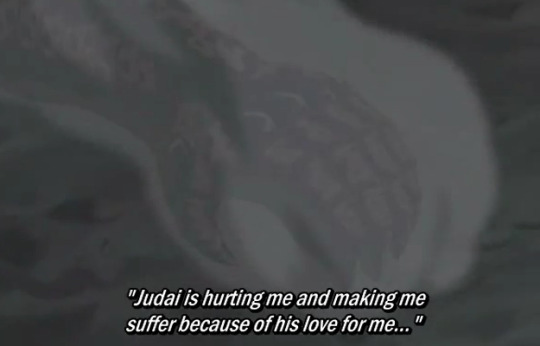
But you see, I couldn't possibly forget about you in the time that I've suffered...
Judai is allowed to move on with his life, to make friends, to spend the next ten years doing so while Yubel is subjected to ten years of agony. When they finally escape their painful torment, they see all the friends Judai has made while they’re left alone and forgotten. However, Yubel’s goal isn’t revenge. Rather, it’s to make Judai share and recognize their pain. WHich is why I said it’s not the fact that they were made to suffer, but their suffering is ignored. Yubel’s entire philosophy revolves around the idea that sharing pain is an expression of love, and that they and Judai share their love for each other by hurting each other.
"That's why I sought to fill all those linked to you, your world, with both sadness and anguish..."
For Yubel, making all of Judai’s friends suffer and Judai themselves suffer is a way of making them and Judai equals again. They want to show “their love” for Judai, but it’s more about forcing Judai to recognize the pain he’s caused them by forcing him through the same pain. Yubel’s philosophy of sharing pain is actually a twisted form of empathy.
They’re not entirely wrong either, that even people who love each other can cause each other pain, and that if one person is suffering alone in a relationship or the suffering is one-sided then there’s something wrong with that relationship.
Yubel: I get it now… You weren’t in love, with Echo. Yubel: No.. you may have loved her just enough to clear the conditions in palace for you to control Exodia, but the you didn’t truly love each other. Yubel: You were only unfairly hurting her, while you stayed unharmed. You wouldn’t suffer. You wouldn’t suffer. You wouldn’t be in pain. Amon: What are you getting at? Yubel: I’ve been hurt! I’ve suffered! I’ve been in pain. That’s why I’m making JUdai feel the same things I did!
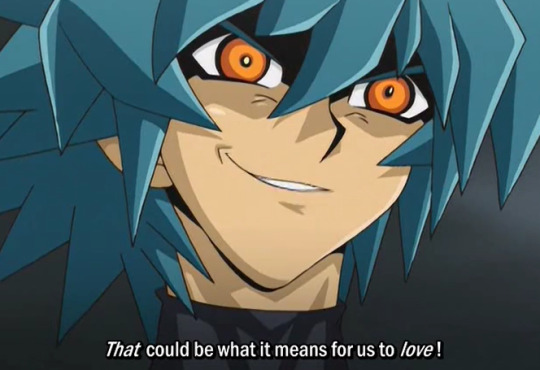
Yubel’s twisted theory of love, is a pretty thinly veiled cry for empathy.
They break out into tears when talking to Amon about the way they’ve hurt and suffered. They clearly state upfront that their goal is for Judai to recognize their love. One of the first things they say to Judai is a plea for Judai to remember them.
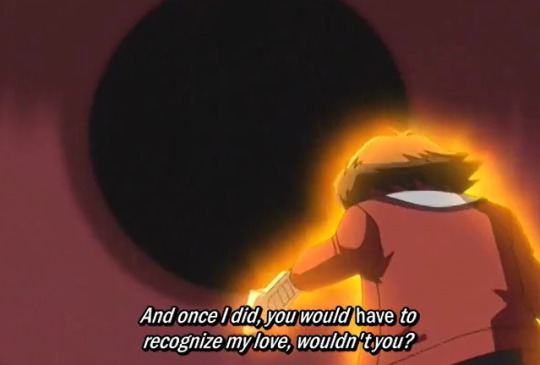
Yubel is presented as a very human character suffering through a lot of pain throughout their entire villai arc, they break down into tears multiple times, they cry out in agony, they're visibly suffering and you see their mental walls begin to break down when Judai denies them any empathy.
Yubel is actually incredibly clear and straightforward about their desire to be saved by Judai. However, Judai doesn’t lift a single finger to help Yubel the entire arc, even though they themselves admit they are directly responsible for Yubel’s suffering but they helped create who they are today.
Judai plunges into a different dimension and gives up everything to save someone, but it’s Johan, not Yubel they try to save. You have Johan, the perfect friend, and perfect victim that Judai gets obsessed over and will not stop at anything to save, and then you have Yubel, the imperfect victim that is actively harming Judai and all of his friends that Judai chooses to ignore. The whole season Judai only focuses on saving the perfect victim Johan, and this is clearly shown to be a flaw. Judai doesn’t just ignore Yubel to save Johan, he also ignores every single one of his friends.
Judai only caring about saving Johan, and deliberately ignoring and abandoning the friends who came with him to help, essentially abandoning them the way he did Yubel leads to another consequence. After he abandons them they get captured, rounded up, and actually die and become human sacrifices.
Losing his friends, causes Judai to snap. Judai becomes the supreme king and decides power is all that matters; he starts killing duel spirits en masse in order to forge the super polymerization card. Which means being left alone, suffering alone, being abandoned by everyone causes Judai to snap the exact same way that Yubel did.
In fact Judai is only saved from his darkest moment, because two of his friends sacrifice their lives, trying to get through to him and appeal to his humanity. At that point Judai’s friends could have just chosen to put him down like a mad dog, to punish him for the amount of people he’s killed, but instead they try to save him because of their friendship.
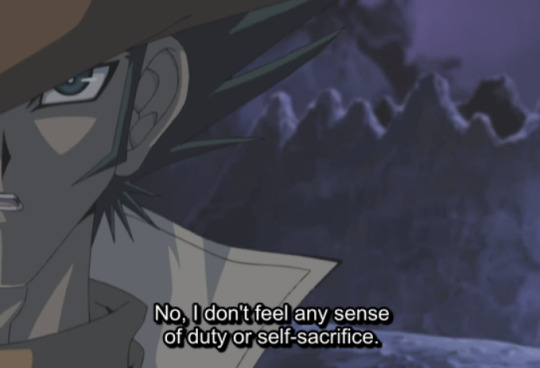
I just want to save my friend. That is all.
By the time Judai is facing Yubel in their final fight, Judai doesn’t have the moral highground against Yubel in any way whatsoever. They’ve both lashed out because of the pain they endured and killed countless people in the process of lashing out. The only real difference between them is that Judai is lucky. He had friends to support him at his lowest point, while Yubel didn’t. Does Judai learn from Jim’s example, and go out of their way to save Yubel the same way they were saved because Yubel is still a friend? Nope, Judai tries to kill Yubel at this point.
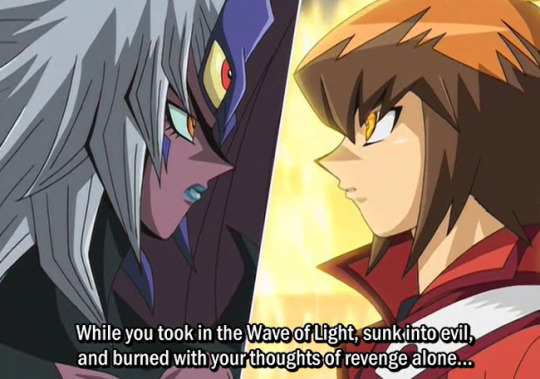
I made a lot of friends... And they all taught me something… real love is wide enough, large enough and deep enough to fill the universe. Your so-called love is only a conceited delusion.
Like, Judai, sweetie baby honey darling. How was Yubel supposed to make friends when they were floating in the empty void of space?
Judai hasn’t learned, they are still ignorant, and still turn a blind eye to Yubel’s suffering. After all if his love is wide enough, large enough,and deep enough to fill the universe then why don’t thy have any room in their heart whatsoever for empathizing with Yubel?
Judai making friends while Yubel was trapped in space doesn’t make Judai a better person than Yubel, it makes Judai lucky. Judai doesn’t even appreciate that luck, because he treats his friends like garbage. It’s not about whether Yubel is worthy of salvation, because Judai is a mass murderer and his friends still went to great lengths to save them anyway. It’s that Judai doesn’t want to empathize with Yubel, because they still want to remain ignorant and irresponsible. Judai wants to continue playing hero, with a very black and white definition of what a hero is. By this point Judai’s killed lots of people, but if he makes Yubel the villain in the situation, he can keep playing hero. He doesn’t have to look at himself and what he’s done, because blaming everything that happened on Yubel and then putting Yubel down like a mad dog allows Judai to absolve his own guilt. Judai practically ignores Yubel’s cries for help, even when Yubel spells it out for them.

I couldn't have lived with the heartache unless I felt that I was being loved...
At this point Yubel themselves acknowledges that their love was just a delusion. That it was a coping mechanism, because they couldn’t live with all the pain otherwise. WIthout it they would have just died, which makes Judai unmoved. The implication here is that Judai thinks yes, Yubel should have just died in that crater. It would have been easier for Yubel to die a perfect victim, then for Yubel to crawl out of that crater and go on to hurt other people. While that may be true the same can be said for Judai - it would have been better if Judai died rather than become the Supreme King. His friends could have put him down like a mad dog, you could have even called that justice - but they didn’t. Judai making no attempt to save Yubel isn’t because he thinks it’s morally wrong to save someone who’s killed as many people as Yubel has, or because he thinks he can’t forgive Yubel, it’s because Judai is taking the easy way out. Johan is a nice, easy victim to save, because he’s Judai’s perfect boyfriend, while Yubel is a complex victim that requires Judai to understand their suffering. Even the act of saving Johan isn’t about Johan himself, it’s about the fact that Judai feels guilt over Johan’s disappearance. What Judai wants isn’t really to save a friend, but to stop feeling guilty over that friend. Judai isn’t just disgusted by Yubel’s actions towards his friend, he also wants to avoid the guilt he feels over causing all of Yubel’s suffering, because it requires acknowledging the complex reality that he is both victim and perpretrator in this case, just as Yubel is both victim and perpetrator.
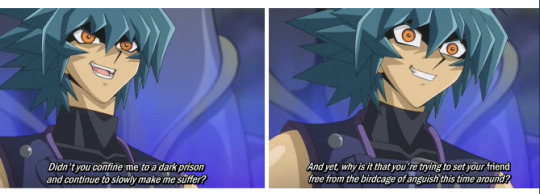
So how can an arc where Judai doesn’t try to save Yubel until the last possible minute, be better than an arc where Deku makes it his goal for the final act of the manga to save the crying boy in Shigaraki?
It’s because the story does not let Judai get away with his continual refusal to empathize with Yubel. Yubel’s entire character revolves around empathy, in the form of sharing pain. As a duel monster, Yubel’s effect is that they are a 0/0 attack monster who is immune to all damage, but when you attack them they deal all the damage back to you. Which means that Yubel will respond to all the pain they feel, by causing you just as much pain in return. Yubel is not a character who can be defeated in a fight, or a duel. In fact they’re the only Yu-Gi-Oh villain who never loses a duel once. The most Judai can do is duel them to a draw, and they draw three times. Yubel wins against everyone else who challenges them. In a way Yubel is like Shigaraki, the ultimate, unkillable enemy that can’t be done away with violence. Judai’s refusal to empathize with Yubel or attempt communication also makes them worse, every time Yubel is hurt they escalate. THe more Judai hurts them, the more they will hurt in return, it’s a cycle that will never be broken simply by killing Yubel, because Yubel is unkillable.
Not only that but the story has gone to great lengths to show that saving Yubel is the correct course of action. If Judai doesn’t save Yubel, he’s basically spitting on the selflessness Jim showed in saving him. In fact if he doesn’t save Yubel, Judai is contradicting his own words on what makes a good friend. Sho once asks Judai after witnessing his brother change, what he should do if a person you lov ehas changed into an entirely different person. What if they're a person you don't even recognize any more? A person you don’t even necessarily like anymore?
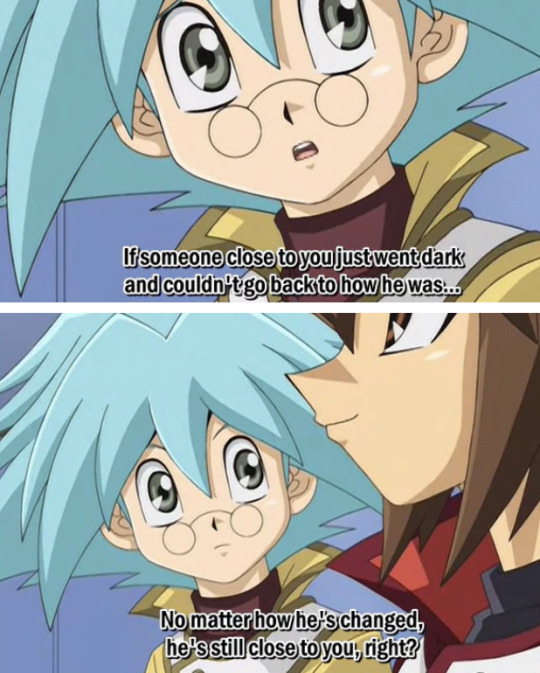
That's why if it were me. I'd probably just be looking after him until the very end, even if I didn't like him. I'd do it cause I think it'd prove that I care about him.
Judai doesn't even say that Sho is obligated to save his brother or morally redeem him, just that he has to keep looking at him instead of turning away or ignoring him.
Judai is being a bad friend, by his own definition. By choosing to deliberately look away from Yubel, Judai’s not living up to his advice for Sho for how you treat people you care about.
Which is why the resolution for Judai and Yubel’s arc is so important, because it’s done by Judai finally acknowledging Yubel’s pain, and promising to watch over them from now on, words that are followed by the action of physically fusing their souls together so they’ll never be alone again. Judai doesn’t just say pretty words about how they won’t ignore the crying child inside of Yubel, but instead he makes a sacrifice to save Yubel at risk to themselves to show their words are backed up by actions. Judai says Yubel will never be alone again, and then he commits.
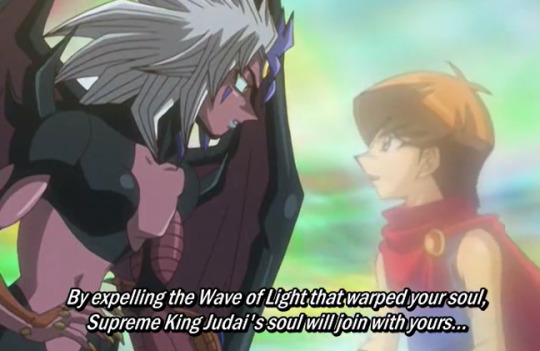
"And even if that means I won't exist anymore... I don't care."
Judai has resolved his character arc by this action, because Judai is finally taking on responsibility and that responsibility is watching over Yubel, so the two of them can atone together. Judai even says himself this isn’t an act of sacrifice on his part, but rather him finally accepting adult responsibilities.
Judai: I wouldn't sacrifice myself for you guys. I'm just going on a journey to grow from a kid into a man.
Judai needed to save Yubel to complete his character arc and grow as a person. If Judai hadn’t saved Yubel, he would have still remained an ignorant child. By learning not to turn a blind eye to Yubel’s pain, and also smacking sacrifices and physically doing something to atone for the way they ignored Yubel up until this point they’ve not only saved Yubel they’ve also done something to address their wrongs. This also continues into the fourth season where Judai’s personal growth results in him learning what kind of hero he wants to be as in Season 4 in order to atone for the spirits that Judai slaughtered, he decides to leave his friends behind and walk the earth with Yubel helping spirits and humans get along with each other. In fact Judai’s final speech as a character isn’t even about how strong he is as a hero, but how weak he is as a person.
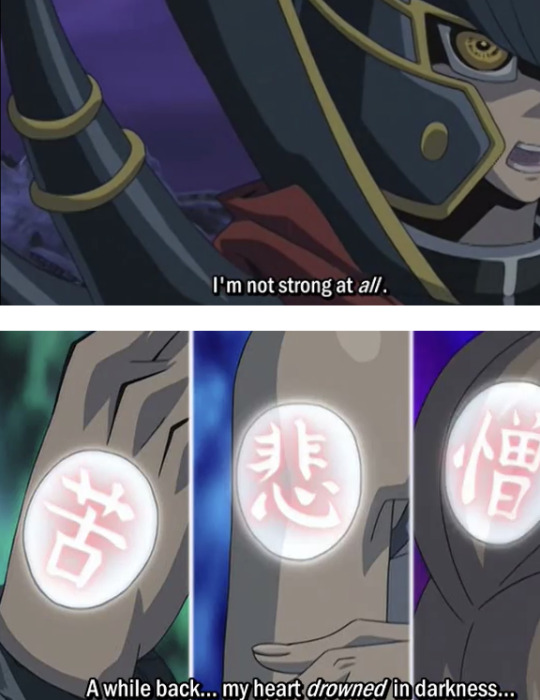
And I put my friends through some rough times. Form that, I figured a few things out... all I can do is believe in them.
The lesson Judai learned is because he’s weak, he needs to empathize and believe in other people the same way that his friends once believed in him when he was at his lowest point. Judai’s not the strongest hero, he’s the weakest one, but that gives him the ability to empathize with people who were lost just like he was, and guide them back from the darkness.
The story of how Deku became the worst hero.
I’m going to say this right now it might turn out next week that Shigaraki is just fine, and he’ll use the overhaul quirk to reconstruct his body. However, even if that happens Deku has completely failed at his goal of saving Shigaraki for the reasons I’ll illustrate below. In theory, Deku’s arc of saving Shigaraki, and therefore winning by saving should be much easier for the story to accomplish and also much less frustrating to watch. After all, Shigaraki has been around since the beginning of the manga, he’s literally the first villain that Deku faces. He’s also the first villain that Deku talks to, where he brings up the idea that there were some people All Might failed to save. There’s also many intentional parallels between the two characters, the entire manga is about their parallel journeys of becoming the next generation hero and the next generation villain. Shigaraki even directly quotes the line at one point that all he wanted was for someone in his house to tell him he could still be a hero, the same line Deku said in the first chapter was that he wanted his mom to tell him to be a hero instead of apoalogizing to him for being quirkless.
Not only is the setup for Shigaraki and Deku made obvious (Deku can redeem Shigaraki by telling him that he can still be a hero too), but Deku himself states out loud that he wants to save the crying child inside of Shigaraki.
Judai runs away from Yubel the whole time, whereas Deku is running towards Shigaraki and actively makes it his goal to understand Shigaraki and continue to see him as a human being rather than a villain. The story also makes it clear that saving Shigaraki is necessary to saving hero society as a whole. After all Yubel is just Judai’s victim. Whereas Shigaraki is the victim of all of society. He’s the crying child who was ignored. The cycle won’t be broken if heroes continue choosing to ignore people like Shigaraki, because more victims will grow up to replace him.
Shigaraki: Everything I've witnessed, this whole system you've built has always rejected me. Now I'm ready to reject it. That's why I destroy. That's why I took this power formyself? Simple enough, yeah? I don't care if you don't understand. That's what makes us heroes and villains.
Shigaraki rejects the world because the world continues to reject him. THe solution to this problem is not rejecting Shigaraki, because Shigaraki won’t go away, the system will just continue to reject people like Shigaraki. As long as heroes and villains don’t understand each other, they’ll keep being forced to fight and the conflict won’t end, because hero society is what engineers it’s own villains.
clear as day by the story itself. If the objective of saving Shigaraki is clear, then how exactly did the story fail in this objective? What went wrong? In this case it’s a failure of framing, and breaking the rules of “show don’t tell.” Stories are all about actions and consequences. When a character makes a certain action in a story, the way other characters around them, the world, and whatever consequences that action frames that action in a certain light. It provides context for how we are supposed to interpret that character in that moment.
For example, when a character does something wrong and another character directly confronts them over what they did wrong, that frames them as in the wrong. The story is criticizing the character for what they did wrong. Context is everything in a story. Stories are just ideas, so they require framing and context to communicate those ideas for the audience. Certain character attributes can be strengths or flaws depending on the context. My go to example is that if you put Othello in Hamlet, the conflict would be resolved in five seconds because Othello’s straightforward personality and determination would have him kill Hamlet’s uncle without questioning things. Whereas, Hamlet constantly questioning and second guessing himself would lead to the worst ending possible. However, if you put Hamlet in Othello, then Hamlet wouldn’t fall prey to Iago’s manipulations, because Othello doubts and questions everything so he wouldn’t believe Iago the way Othello did.
Hamlet’s contemplative and introverted nature can be a strength in one situation, and a flaw in another. Othello’s tendency to act without thinking things through can be a strength in one situation, and a flaw in another. Context matters, because context tells you how you’re supposed to interpret a certain characters actions, and therefore tells you more about that character. This is why people repeat “Show don’t tell” as the golden rule of storytelling, it’s one thing to say something about a character, it’s another to us the characters actions in the story itself to show them something about the character.
What’s even worse then breaking the rules of show don’t tell however, is telling the audience one thing, and then going onto show in the narrative something completely different. In that case the narrative becomes muddled and confusing to read. If I the narrator say “Hamlet is someone who overthinks everything” and then in the story Hamlet walks up to his uncle and kills him with no hesitation, then the narrator is straight up unreliable. It becomes impossible to tell as an author what message I’m trying to get across about these characters, because I’m telling you one thing and showing another.
This is why the writing fails in the second half of My Hero Academia because we are constantly told one thing, but then the story shows something entirely different and sometimes even contradictory to the thing we are being told.
Judai is a much worse hero than Deku, he always runs away from Yubel, and we’re never directly told that he’s supposed to save Yubel either. However, the narrative is incredibly consistent. Judai’s behavior of running away is consistent with his character. All the other character call Judai selfish for abandoning his friends (and they’re not even talking about Yubel). Judai is never painted in any positive light for his actions, therefore we as the audience understand Judai’s behavior is wrong and he needs to fix it. The narrative makes it clear that Judai needs to grow up, and Judai is never rewarded for his refusal to grow up, he’s ruthlessly chewed out, not by his enemies but also by his own friends. However, the narrative isn’t merciless on him either. Season 3 of GX is dark, but it’s not grimdark. Even when Judai loses his way, he’s still shown love and compassion by those same friends who go to great lengths for his sake. The narrative criticize Judai but it never insists that he’s beyond redemption and needs to be put down like a mad dog.
The message is very clear, that not only does Judai need to grow up, but he also deserves the chance to grow and change, which is why he should give Yubel a similar chance. In comparison the story sets out this clear narrative arc for Deku of understanding Shigaraki, but it never challenges him for failing to understand Shigaraki. If you listen to what the narrative says, how other characters describe Deku, and what Deku himself says and only read it on a surface level then yes, Deku’s goal is to save Shigaraki. If you analyze actions however, he is in effect just like Judai he never takes any meaningful action or steps towards Shigaraki, nor does he think of what saving Shigaraki might look like or entail.
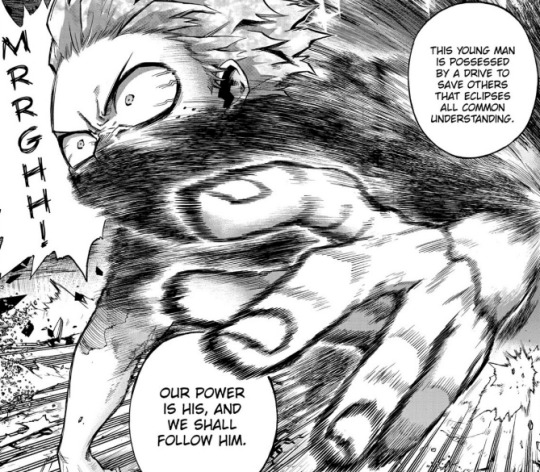
The story describes Deku as someone who is possessed by a drive to save others that eclipses all common understanding, but does the story give us any examples of that behavior?
Judai is characterized as a selfish, irresponsible child, and the story gives us countless examples of his immaturity and how it hurts others. Does the story of MHA do the same for Deku's purported virtues? Let’s run through Deku’s actions, step by step, the actions themselves and how they are framed in order to find any evidence that Deku possesses this drive to save others. Does Deku reflect at all on the question of:
Can Shigaraki be Saved?
Deku leaves on a journey to try to understand villains. When he makes a perfunctory attempt to understand and empathize with Muscle, and Muscle replies that some people are just evil does Deku keep trying to reach his heart? Nope, he just punches him.
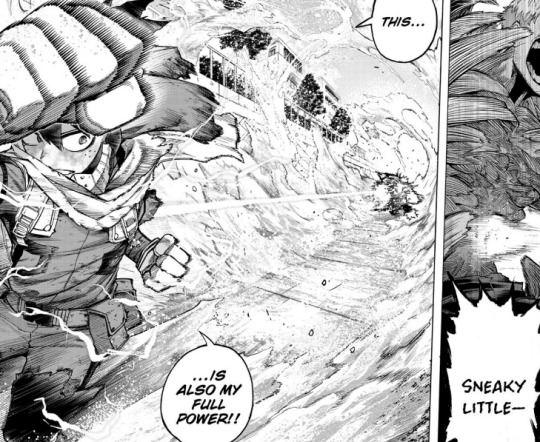
Well, if he’s failed in his goal of understanding a villain then does the story call him out on his failure? Does Deku face any sort of narrative consequence for that failure? Is he framed negatively for failing to understand Muscle, the same way that Judai is framed for abandoning Yubel? Nope. Deku doesn’t express any frustration at all over is inability to reason with Muscle. There’s also no negative consequence for Deku just choosing to punch muscle, it turns out that there was no reasoning with Muscle and some people are just bad eggs so Deku was right. It’s okay for characters to fail, but if a character fails and it’s not framed by the story as a failure then the writing itself as failed. Why even bother to include this scene in the first place if it doesn’t advance Deku’s character in any way? This scene in spite of showing Deku failing to understand someone actively paints Deku in a positive light, because of how much stronger he is ow that he can OHKO a guy that gave him trouble all the way back in the camp arc.
This scene doesn’t tell anything about Deku as a character, it just makes him look cool. In fact that’s precisely the problem, Deku isn’t adequately challenged as a character, because he’s never allowed to fail. Even when he does obviously fail at the things the narrative set out for him to do, he’s never challenged on those failures, because the priority isn’t to make Deku grow, it’s to make Deku look good. As I said before, Judai is the hero because he’s the weakest. Deku is the hero because he’s the strongest. Well, next a big flaw on Deku’s part is that he worshippd the same heroes that were making the world corrupt. Heroes like Endeavor who created people like Dabi. So, does Deku take action to either criticize the older generation of heroes, or separate himself from them in order to try to be better than them? Nope, he teams up with them. Not only that, Deku can’t do something as simple as tell Gran Torino out loud about his plans to save Shigaraki. If Deku feels that Shigaraki is worthy of salvation then he should at least try to make an argument here about his ideal of saving others.
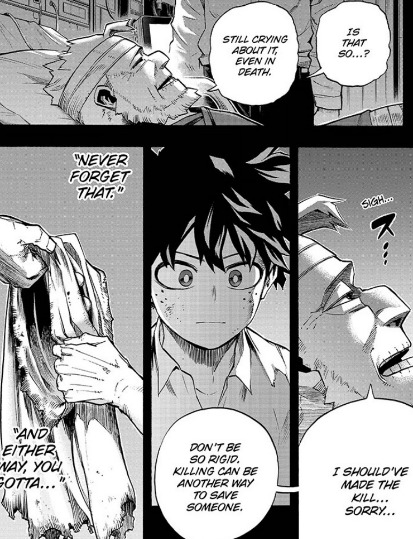
Now here’s the thing, if Deku hadn’t directly looked at the camera and told us he wanted to save Shgiaraki, would we be able to deduce his intentions from his actions? If you took away all of Deku’s internal monologue, and just showed him punching Muscular and saying nothing when Gran Torino says he may have no choice but to kill Shigaraki would anything about Deku’s actions indicate that he wants to save Shigaraki? Let me use avatar the last airbender as a positive example for a moment. People say that Aang’s desire to spare Ozai’s life comes out of left field, but like if you analyze Aang as a character down to their bending, and the way they react in situations they always prefer de-escalation, or taking a third option as opposed to confronting things head on. It’s literally why Toph says Aang has trouble learning earth bending, because as an airbender, he always tries to look for some other way to solve the problem, instead of a direct confrontation with force. As early as season one, Aang tells Zuko someone who has tried to kill him several times that he was friends with someone from the fire nation one hundred years ago and in a different situation they could be friends. Aang’s desire to save the Firelord may not have been told to us until the last possible minute, but Aang’s aversion to violence has always been a part of his character from the beginning. However, Deku never shows any similar aversion to violence. There’s basically no example where he ever tries to de-escalate a situation, or he avoids a conflict by seeking a third option.
Anyway, let’s move onto the next example. In the confrontation where Lady Nagant fights Deku, when Deku learns the fact that the heroes were employing government hitmen to attack people for uhh… exercising free speech does Deku give any reaction to this information? When Lady Nagant says that Deku is only going to bring back the status quo, does he show her any meaningful evidence that he won’t do that.
Deku’s response is because the world is so grey, he needs to extend a helping hand to others. Which you know what thay could be a response. Deku saying that his response to the corruption of the hero world is that he now understands that society led some people down the wrong path, so his way of addressing the wrongs of that society is lending a helping hand to as many people as possible even people he used to think was irredeemable.
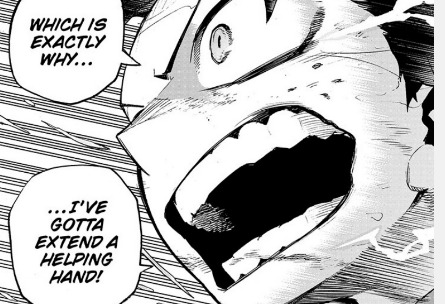
I will give Deku the benefit of the doubt, I think this is an acceptable answer. I can’t save everyone, but that’s not going to stop me from trying to save as many people as possible and maybe I can save people who were this society’s victims on the way too. However, does Deku demonstrate his resolve to extend a helping hand in any meaningful way.
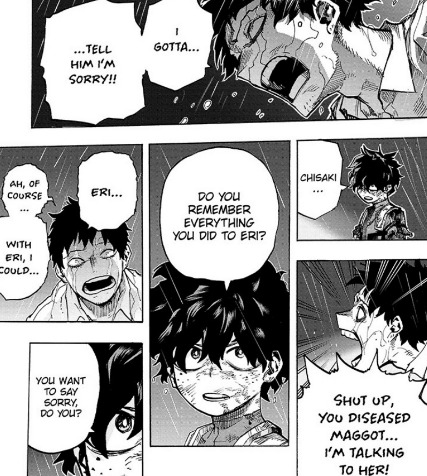
Deku is met with an armless, insane Overhaul who’s begging for someone to help heal his father figure in the Yakuza from his coma. This isn’t like Muscular who insists that there’s no helping him, Deku is met face by face with someone asking him for help. Deku’s gotta extend a helping arm whenever he can, because he knows some people were abandoned and led astray by this society… Unless that person is someone he doesn’t like personally. At which point he only helps them on a conditional basis. We are told Deku will save anyone and everyone, but Deku is met face to face with an armless man who is begging for help and Deku’s does nothing to help him. Deku’s not criticized for refusing to help overhaul either, it’s never brought up again. When Deku begins to experience a mental breakdown because of all the people he’s trying to help in the Dark Deku arc, we are told this is the result of Deku trying to save everyone, but we do not see Deku attempting to save a single villain after Muscular and Nagant.
He exhausts himself beating up villains that AFO sends after him, and only helping innocent civilians. Which would be fine if this arc were about how Deku is running away from his real responsibilities the same way that Judai was running, but that’s not what we’re being told. We are told that this is all part of an arc of Deku learning to understand villains and be a hero.
Deku is asked “Can you save Shigaraki?” by the story, but Deku never at any point has to deliberate on that question. Judai doesn’t deliberate on that question either, but him choosing not to think about things and stay ignorant is the point.
It’s actually fine to make Deku stagnate as a character. It’s fine to have him take the easy way out by just punching villains and giving up on them after one conversation. It’s fine for him to be empathetic to other people’s suffering, or even self-righteous. It’s fine for him to be ignorant.
He could be all of those things if it was a part of a narrative teaching him to unlearn his behavior. In fact the narrative might have been better if Deku started out by saying he didn’t want to save Shigaraki, that there was no choice but to kill him, because then at least his actions would be consistent with his words. Then his lack of empathy and his tendency to resort to violently beating up villains instead of avoiding violence would be character flaws he could work on. Deku however, is presented to us as this empathic hero who is always willing to give others a second chance though he never actually sticks his neck out in order to do so. Continuing on with our slow crawl through MHA, one of Deku’s friends is revealed as the traitor. Deku has a heartwarming scene fo saying that Aoyama can still be a hero, but look at his actions. He lets the adults in the room physically tie Aoyama in a straightjacket and imprison him, for the crime of… doing bad things while he was in a hostage situation. Apparently, if a bank teller helps the bank robber by giving them money when the robber has a gun to his head, the swat team should just snipe the bank teller. Not only does he not defend Aoyama against the adults, or stand up for him, or tell the adults they’re wrong to treat Aoyama a clear cut victim who had a gun to his head and was bing held hostage like he’s a villain - he also lets the adults use Aoyama an innocent victim as bait in order to lure out AFO. Deku tells Aoyama he can still be a hero, but he doesn’t defend Aoyama as a victim of being taken hostage, nor does he stop the adults from further taking advantage of him and throwing him right into danger. Some people are just led the wrong way that’s why they need to be extended a helping hand, but fuck Aoyama I guess. He needs to earn the right to be sympathized with by physically putting his life in danger.
Deku can’t even go out of his way to save a friend who he’s known for the better part of a year, when that friend is a complex victim forced to do bad things.
Then Deku and Uraraka have a conversation where they both, kind of ruminate on the idea that maybe the villains are human beings who are worthy of sympathy.
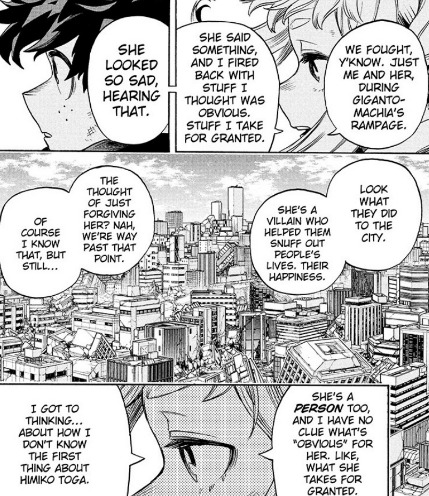
In fact Uraraka is actively trying to dehumanize Toga by looking at the destroyed city, so she won't have to think of Togaas a person.
The language here is also a major fault of this arc. It focuses far too hard on “forgiveness” over and over again. As I said before, saving Shigaraki isn’t about Shigaraki at all, it’s about Deku, and how he wants to use his power as a hero. Deku has even stated himself that he doesn’t believe that OFA is a power that should be used for killing people. So why does whether Toga or Shigaraki are forgivable or not even matter? It’s the same with Deku refusing Overhaul any sympathy. If he’s so morally opposed to abusers, then why does he work with Endeavor and defend him at every visible opportunity, even in front of his victims? Whether or not Deku can forgive Shigaraki doesn’t matter, because Deku is not the moral arbitrator or right and wrong. In fact Deku doesn’t even have any morals, so how is this a moral debate? Is there any point where Deku gives a clear definition of what he thinks right and wrong is? Does he quot Immanuel Kant to the audience?
Batman doesn’t kill people, not because he thinks that every last person on earth can be saved, but because Bruce Wayne an incredibly rich white man thinks that maybe he shouldn’t have the authority to decide who lives and who dies. When Bruce doesn’t kill the joker, it doesn’t mean he thinks the Jokers actions are forgivable, it’s because Bruce thinks it’s not his place to determine whether someone has the right to live.
The whole conflict that MHA presents us is that heroes pick and choose who to save, and only save the ones they deem as innocent. So, how does Deku saying repeatedly they can’t forgive Shigaraki contribute to that theme in any way? In fact by focusing on forgiveness, rather than whether or not he personally has the right to pick and choose who lives and who dies Deku is ignoring the elephant in the room. The question isn’t about whether Shigaraki’s redeemable or if his deeds should ever be forgiven. The question is whether Deku has the right to decide who gets saved and who doesn’t.
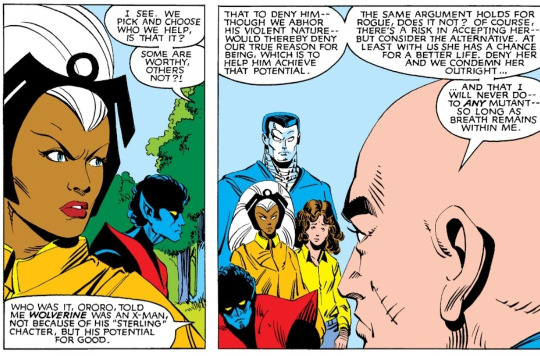
We are told that Deku as a character is someone who wants to save everyone no matter what, so Deku shouldn’t be focusing on whether or not Shigaraki is worthy of forgiveness, he should be making an idealistic argument like Xavier does in this panel. Why doesn’t Deku talk out loud with Uraraka on how he believes his power is for saving others, and not killing? If he’s meant to represent some idealistic hero, then why doesn’t he even talk about his ideals? Why don’t I as the reader know what those ideals are?
I think Xavier’s ideals of forcing the X-men to provide a good example to the mutant community, in order to try to earn the respect of other human beings is wrong, but at least he has ideals. He tries to inspire the other people around him to live up to those ideals. The story can criticize him for his ideals and point out how they’re wrong, while it can also uplift parts of his idelogy like where he believes there are no evil mutants. Deku has a chance to do the same to Uraraka, to tell her clearly, “I don’t think we as heroes have the right to pick and choose who we help…?” but he waffles. Not only does he waffle, but this moment is meant to be read as an indication that both Deku and Uraraka are sympathetic individuals who want to save their villains. They are supposed to look good and idealistic here and they don’t. For Deku it just seems like a repeat of his behavior with Overhaul. The only villains that are worthy of sympathy, are the ones that he personally decides are forgivable.
The story isn’t about whether or not it’s moral to save someone who’s killed as many as Shigaraki has. The story never seriously discusses any sort of complex morality or moral philosophy. Once again to bring up avatar, yes you can argue Aang sparing the life of a war crimminal is bad, but Aang mentions on multiple occasions that he wants to retain the cultural values of the airbending people. Aang has a morality, a consistent morality, it might not be a morality you personally agree with but at least he has one. Deku hates abusers, unless he’s next to Endeavor then he thinks abusers should be given the chance to atone. Deku doesn’t believe that One for All is a power for killing, but he never stands up to any of the adults who are blatantly trying to kill Shigaraki, he doesn’t even express out loud to Uraraka that he doesn’t think heroes have the right to decide who lives and who dies. In fact he’s given the perfect opportunity to, when Hawks kills a villain and it’s broadcast live on the news in font of everyone, but Deku never has anything to say about that. The reason Deku and Uraraka both put such an emphasis on “forgiving” their villains has nothing to do with the story itself. It’s because the author Horikoshi, is afraid that some people will misinterpret his story as saying that he actually thinks that saving a villain like Shigaraki means that he condones mass murder, so he has to have the characters talk about not forgiving Shigaraki.
Judai doesn’t have any consistent morals either, but once again that’s the point and something the story relentlessly calls him out on.
Cobra: Fortune would never smile on a fool like you who fights while prattling on about enjoying duels. Cobra: You are certainly a talented duelist. But you have one fatal flaw. Judai: A fatal flaw? Cobra: Yes, your duels are superficial. Someone who fights with nothing on his shoulders, cannot recover once he loses his enjoyment. What a duelist carries on his shoulders will become the power that supports him when he's up against the wall! Cobra: But you have nothing like that! Those who go through life without anything like that cannot possibly seize victory. Cobra: But I know that nothing I say will resonate with you... because you have nothing to lose but the match. Judai: I... Cobra: Afraid aren't you? Right now, you have nothing to support you.
Judai’s regularly called out for his superficiality. Judai is only a hero because he’s strong and wins fight, he doesn’t feel any responsibility towards other people, and in fact he loathes having to feel responsible for others. Judai isn’t just naive, he deliberately chooses to remain ignorant. Since he’s ignorant of his own faults, he makes awful decisions when it comes time for him to lead, and his friends die because of choices he made. We are told that Deku doesn’t want to remain ignorant, that he wants to understand villains, but Deku’s actual actions are him continuing to ignore society’s ills and the suffering of victims. In fact if you take away Deku’s internal monologue and the narration, Deku’s actions almost exactly mirror Judai’s.
Deku is just as superficial as Judai, and he also doesn't want to spend any time thinking about what kind of hero he wants to be, but the narrative never punishes him for it.
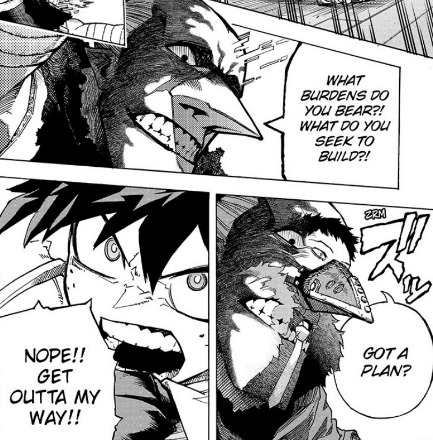
Judai is asked what burdens he has to bear and he has to meaningfull answer that question, Deku is allowed to get away with not having to think about anything. Deku remains superficial. Both Judai and Deku spend the entire arc running away from their villain rather than confronting them in any meaningful way. They both never express out loud any sympathy for their villain, or try to empathize. THey both never step down from the role of hero, and only confront their villain as a hero, because they don’t want to think about themselves as complicit or in the wrong. Shigaraki and Deku’s final confrontation mirrors Judai and Yubel’s but without the same clear framing. THe entire time Yubel is trying to get Judai to empathize with them, and Judai only responds with physical violence, because they don’t want to stop being the hero and because they can’t see Yubel as anything other than the villain. As soon as Deku arrives on the battlefield (by the way everyone else and their mom pointed this out, but Deku who doesn’t think OFA is a power for killing, is completely okay with a plan called the “Sky coffin plan” where every other hero was clearly trying to murder Shigaraki).
When Deku arrives he asks if Shigaraki is still in there, but he doesn’t do anything to try to reach Shigaraki, he jumps right to punching him. In fact he never tries anything besides punching him as hard as possible. How is punching Shigaraki with the force of a thousand suns saving him exactly? How is that different from how he tried to defeat Shigaraki the last war arc, before he saw the image of the crying child that made him want to try a different approach in saving Shigaraki? In Judai’s final fight with Yubel, it’s made explicitly clear that Judai is not trying to save Yubel, and that’s a fault on his part. In fact Judai gives the traditional “I have friends, and you don’t” speech to Yubel but it’s a subversion of how that speech is usually used. Usually that speech is used to show that the protagonist won because of they valued friendship,while the villain treated their friends poorly and only cared about power. However, it’s ironic in this case because Judai got all of his friends killed. Judai treats his friends like garbage. This speech isn’t used to show that Judai is winning because he values his friends more than Yubel does, it shows that Judai is a hypocrite, playing the hero in this situation where they are just as bad as Yubel. Judai’s not morally superior, he’s just lucky that he has good friends. Friends that were willing to save him. The only connection Yubel has to anyone else, Yubel’s only friend is Judai and Judai is a shit friend.
In fact, Mirio tries to give a version of the “You don’t have any friends” speech to Shigarkai, only for Shigaraki to get mad and tell Mirio that he does have friends and people he wants to protect.
This fact is also something that is blatantly ignored by Deku, even though Mirio tells him about it… even though we are told that Deku is trying his best to see the humanity in Shigaraki.
Judai blatantly admits they’re trying to kill Yubel. Which makes them a worse person, but a better character than Deku, because their actions are clearly framed by the narrative and consistent.
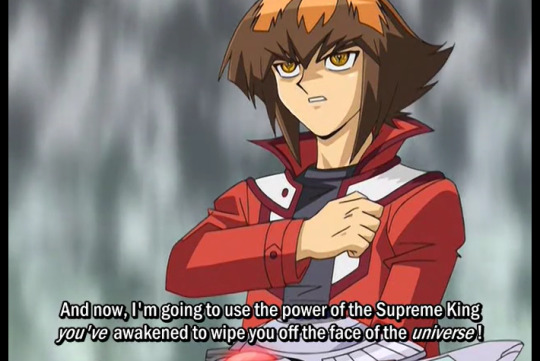
On the other hand we are told that Deku doesn’t want to kill Shigaraki, and yet everything Deku does makes it look like he’s just trying to kill Shigaraki and put him out of its misery. If we didn’t have Deku stating out loud that he wants to save Shigaraki and wants to see him as a human, there’d be nothing in his actions to indicate that he’s trying to avoid killing Shigaraki. Deku says he can’t pretend he didn’t see Shigaraki crying, but like, does he ever hesitate to punch Shigaraki, does he ever think that causing Shigaraki more harm is wrong when he’s already suffered so much? Deku says that Shigaraki is a person but does he treat him like a person? Does he try to talk to him like a person? To use avatar again, Aang does talk to Zuko pretty early on. Deku doesn’t even give the classic “We could have been friends under different circumstances” speech. When Shigaraki resists Deku’s attempts to see him as a person or emapthize with him, Deku’s response is to just resort to punching harder.
Which is in effect the same thing Judai does to Yubel, just kill them as a villain so they don’t hurt anybody else, but framed in an entirely different light. Judai is shown to be ruthless, and cold in his attempt to only settle the conflict with Yubel by violently putting them down. On the other hand we’re being told that Deku is compassionate and empathic while he punches Shigaraki with the force of a thousand suns.
There’s another eerie similarity between both of these final confrontations. At the climax of the confrontation, both Judai and Deku have a psychic vision where they see events from Yubel and Shigaraki’s childhood. This vision is supposed to help both characters understand the good in the villain they’re facing.
Let’s see the contents of this vision and how the visions change each character. Judai is shown a vision of his past life where Yubel sacrifices their entire body, and even their humanity to go through painful surgery to turn into an ugly dragon, all for the sake of protecting Judai in a previous life.
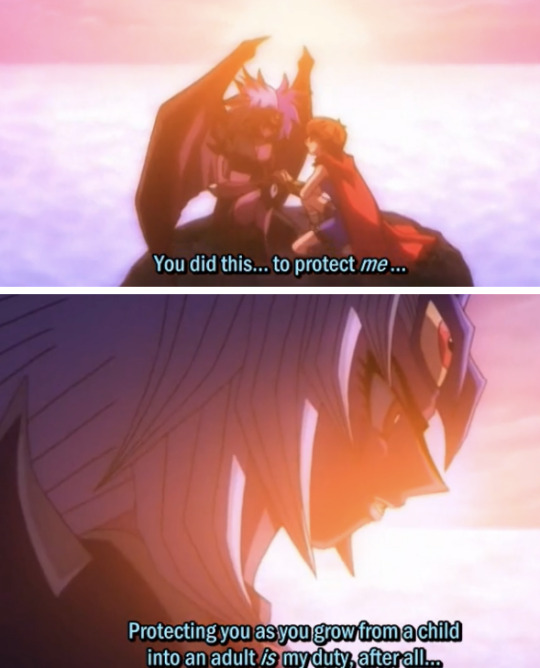
Judai is then forced to witness the good side of Yubel they’ve been ignoring all along to paint them as a villain. Yubel is simultaneously extremely selfish and willing to hurt people Judai cares about, but they’re also extremely selfless and will do anything to protect Judai and have made great sacrifices in the past for Judai’s sake. Deku gives lip service to not ignoring the humanity in Shigaraki, but Judai is literally forced to acknowledge the humanity in Yubel. Not only that, but Judai changes his behavior immediately after learning this new information. After seing the sacrifice that Yubel made for him in the past, Judai responds with a sacrifice of his own. A sacrifice that perfectly mirrors the sacrifice that Yubel once made for him. Yubel gave up their humanity for Judai, so Judai fuses his spirit to Yubel’s, becoming a human / spirit hybrid so Yubel no longer has to be alone.
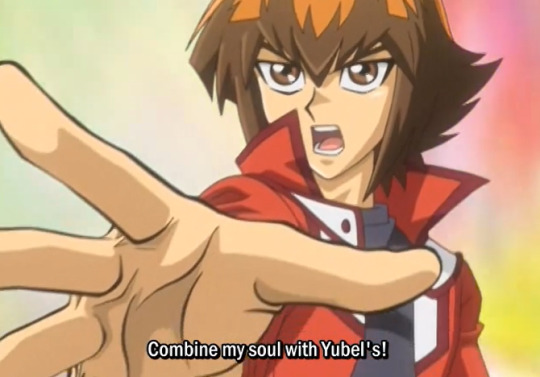
Judai also doesn’t just fuse their soul with Yubel’s in order to stop Yubel from destroying everything, it’s because both of them at this point need to atone together, and Judai is fulfilling his responsibility of watching over his friend until the end to prove that you care about them - as he said to Sho. Judai’s also fulfilling Johan’s dream of helping repair the bonds between spirits and humans, by reconciling with Yubel and repairing their bond. It’s also Judai atoning for his previous behavior of abandoning Yubel, by choosing to stay alongside them as they both atone together. Deku does sacrifice OFA during the fight against Shigaraki, but their sacrifice isn’t to help Shigaraki, but rather doing psychic damage to Shigaraki by using OFA is the only way to defeat them. He transfers OFA in order to break Shigaraki’s brain so he’ll stop reissting and Deku can beat him down. Judai fuses their soul together with Yubel out of empathy and a responsibility they feel to help their friend fater abandoning them, Deku transfers One for All to Shigaraki in order to hurt him and make him easier to punch. It's funny that Deku doesn't travel to Shigaraki's mind to learn more about him, but instead with the specific intent of harming him.
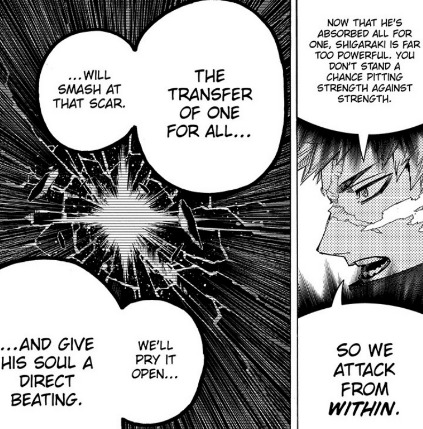
Once he's inside Shigaraki's mind, he doesn't take time to reflect on how Shigaraki used to stand up for bullied kids, or how he wants to be a hero to villains because no one else will stick up for the outcasts in society. No, he only care about Shigaraki when he takes the form of a child crying for help.
In the aftermath of the psychic vision Deku’s behavior doesn’t change towards Shigaraki in any way either. You could say he sacrificed his own arms in order to try to comfort Shigaraki within the depths of his own mind - but that’s not a real sacrifice either because his arms immediately come back. When Judai learns about the sacrifice that Yubel made in a previous life towards him, he stops seeing Yubel as an enemy and finds a way to resolve things peacefully between them. When Deku lanterns that Shigaraki’s a victim of All for One, and that his entire life was a lie, when he sees Shigaraki’s suffering first hand does his beavior twoards Shigaraki change in any way?
When he sees Afo has taken over Shigaraki’s body again, does he try to shout for Shigaraki, to tell Shigaraki to fight from the inside, to reassure Shigaraki that he’s still in there that there’s still good in him? Nope. He just punches Shigaraki some more.
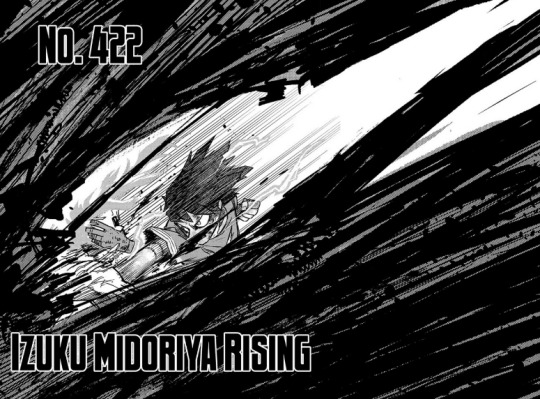
What Deku needed to tell Shigaraki is so obviously set up by the narrative too. Shigaraki wanted just one person in that house to tell him he could be a hero. Deku wanted his mother to tell him he could be a hero if he was quirkless. Deku sees that Shigaraki started out as a boy who wanted to be a hero, and who was manipulated into being a villain but does he try to appeal to the boy inside of Shigaraki by telling him he can still be a hero? Does he now see the good in Shigaraki? Nope, he just tries to kill him by punching him really hard.
I purposefully chose the images for the banner of this post, because it shows how differently MHA and GX treated its villains in the end. Yubel is embraced by Judai in the end, Shigaraki evaporates into dust.
"Judai, now that our souls have become one we will never be separated again. I have now been filled with your love and power. Let us fight together, against the wave of light leading this universe to destruction!"
Shigaraki could so easily have been given the love and empathy that Yubel was shown, but instead their life ends with no show of empathy from Deku, and with them dying believing that their long life of tragedy meant nothing in the end. Shigaraki realizes he's a crying kid, but he's never comforted.
Shigaraki: I only stole my body back from Master, and I didn't destroy anything. "In the end, I was just as you said... A crying kid, huh?"
Yubel is embraced and comforted, Shigaraki disintegrates into nothing.
One of these stories is apparently an optimistic story about heroes saving people, but it ends with the lifelong victim being killed in the most nihilistic manner possible, never receiving comfort, and never achieving anything with his long life.
The other story is a silly anime about card games, shows that when people are alone and suffering they can lash out and do terrible things. That all people are weak especially when they're alone, but the solution isn't to abandon them, or condemn them for their faults, but to believe in them and help uplift them the same way that Judai decides to uplift Yubel so they can atone together.
Which is why Deku gets an F in being a hero. Go directly to summer school. Do not pass Go. Do not collect $100.
#mha meta#ygo meta#mha 423#bnha 423#mha 423 spoilers#bnha 423 spoilers#izuku midoriya#deku#shigaraki tomura#tenko shimura#judai yuki#yubel#soulshipping#yu gi oh gx#yu gi oh
707 notes
·
View notes
Text
𝗚𝗜𝗬𝗨𝗨 𝗟𝗘𝗔𝗥𝗡𝗦 𝗧𝗢 𝗖𝗥𝗢𝗖𝗛𝗘𝗧
𝙨𝙮𝙣. ━ giyuu decides its time to tell you how he feels.
━ 𝙖𝙣𝙣𝙨 𝙣𝙤𝙩𝙚𝙨. this is part two. or not, it really doesn’t matter if you read the first part. loved this idea bc i love crochet. currently making a giyuu amigurumi doll atm, so yay me ig
━ 𝙖𝙙𝙙𝙞𝙩𝙞𝙤𝙣𝙖𝙡 𝙣𝙤𝙩𝙚𝙨. im so sorry for being gone for almost two months. i was burnt out. but i have lots of prompts / plot ideas written down and just have to finish them. also also!! season 4 was crazy, i loved every minute of it but that ending – im so not ready for the final arc. anyways, thank you for the support as usual, luv u besties
━ 𝙬𝙖𝙧𝙣𝙞𝙣𝙜𝙨. fluff. use of swear words (not a lot, but they are there). giyuu-centric. modern reader in kny. mentions of crochet and amigurumi. gender-neutral reader. also very poor dialogue probably, i avoid talking irl so yk. 1.9k words.
first part (optional); giyuu has a crush
Giyuu is about to have a stroke. He’s alone in his room late at night. He should be sleeping, but he can't imagine doing so. The moon light is coming through his window and all he can do is stare at the crochet hook in his hand as his fingers remain still. He is hunched, hovering over a ball of yarn in his lap. He can't shake the feeling of inadequacy that heavily weighed on him because he really has no idea what he’s doing.
You had this habit of making him gifts. Cute little amigurumi things and it had become a habit of his waiting when you’ll show up with one just for him. They’re almost always an animal or some sea creature, maybe even a small plant that he has sitting on display in his room somewhere. They are always so adorable and tiny, always fitting in the palm of his hand. It's almost like clockwork at this point, and Giyuu is always so flattered to receive them.
He remembers the little tiny baby sea turtle you have made for him. Its flippers rested against the palms of his cupped hands; its eyes and lids sewed on so perfectly along with the rest of it. It’s so intricate, he almost thought it was real. He remembers bringing it up to his face, staring at it in its tiny face, because for some reason this time he really didn’t know how to act.
He remembers you giggling, quickly explaining that you really didn’t know what to make him this time – lies, you have so many patterns. You just care too much about his opinion and his likes. Honestly, you could make him anything you wanted and he would be happy.
❛ And then I thought, ‘well you are the Water Pillar after all’. And I thought the sea turtle was kinda cute too, so I wanted to make it for you. Now you have a little friend to keep you company on your mission! ❜
Now here he was, with little idea of what he was doing. A frustrated sigh left his lips. He began working the yarn along with the hook – all his movement completely hesitant and fumbling. It would be a lie to say that he had never been skillful with his hands; he is a swordsman after all. However, it was clear that he wasn’t as skillful as you regarding this, and it makes sense. He had never picked up any knitting or crochet hooks until tonight at this ungodly hour.
Sure, he could have just crafted a wooden figurine. It is something he vaguely knows how to do, and seems like a more appealing thought now, plus, he knows that you would love it either way. But all he wanted to do was something special. He wanted to convey his feelings to you through what you love doing the most and give you something that he knows you would like. And for about a moment he wonders if this is a good idea. Then decides that he doesn’t care anymore. This is going to make or break him. He procrastinated this long enough.
Though hours passed and Giyuu is shocked to consider it done. He hoped it was. He glances over at his window and the sun is barely over the horizon. And as much as Giyuu loves you, he can't do this again. No, that is also a lie. He would if you asked. But he couldn’t help but feel disgruntled. He didn’t even know what he made. It is some type of plushie. It has a big body with some stubby legs. Its arms are almost the length of it too, if not longer, making them seem like large floppy paws. Its head; he is unsure if it's too big as it’s the same size as the body, but it’s a bit too late now to do anything about it. He made small ears on the top, and added some type of embroidery to make the eyes – as no buttons seemed to look right to him. There was no nose or mouth either, because Giyuu couldn’t figure out how to add them without making it look worse than it already does.
He frowned at the finished product, before hanging his head. It was done, yes. But to him, he knows that he could have done a much better job. And the pang of disappointment didn’t help. Because surely you deserve something better than this crude attempt at a gift.
However, for some reason Giyuu was oddly excited. Maybe it was the ice cold water he almost drowned himself awake to. But he really didn’t pay it any mind. Maybe he just didn’t care anymore. Maybe he just wanted to get it over with. He was afraid, so very afraid because this was the first time he was outwardly seeking your validation. But he was also anticipating the interaction. Because you were so nice. And he shouldn’t be afraid.
So here he was now, standing in front of you. And suddenly, he can't remember why he was so afraid in the first place. You looked so delightfully happy just like he had hoped. He watched as you took the plush from his hand, your fingers just barely brushing against his. And he felt his palms get clammy again. You were so delicate with it, and honestly, if you had asked Giyuu, perhaps you were a bit too delicate. He didn’t think that it deserved such care. He watched as you brushed your thumb over the soft yarn. Your eyes staring intently at it, and Giyuu couldn’t place the look you were giving.
“Giyuu, it’s adorable!” Your eyes sparked just a little bit when you looked back up at him. The plush is pressed against your chest right now. So softly, almost protectively and Giyuu actually can't believe it. Truly, he is in disbelief. You actually liked it? You really must’ve, because you’re going on about the plush; gushing over it and completely unfazed by any of its imperfections. You asked how he made it and when he had the time. It was nice, until you asked him why. And he got all nervous again.
Well… He responds. “You make me such nice things all the time. And I wanted to make you something as well. To show my appreciation.”
Oh! You are a little taken aback by that as a light blush starts to burn on your cheeks. You were definitely feeling the appreciation. You just never really anticipated Giyuu to make you something. Not because you thought he was incapable, or anything like that. You just… liked making things, and if that happened to be for Giyuu more than others you weren’t going to deny it. It made you happy to do so. And you never really expected anything in return. But for him to make you something, the gesture kind of made you feel special. It was so sweet!
“Of course, I’m glad you like it. You… mean a lot to me you know. Um…” He stops because he's a bit flush. He wants to confess so badly and he doesn’t understand; why is it so hard. Just say it. It's like you are waiting for him to – and you are – but you are so completely and utterly patient with him that sometimes he wished you weren’t. “Ngh, don’t look at me like that.”
You giggle softly. You can’t help it. Why is he so cute? “I’m sorry,” You say sincerely, still hugging the plush to your chest. “Please continue.”
His heart is beating out of his rib cage. He feels like he is going to die. He has never expressed his feelings so openly before and as much as he wants to say that he is uncomfortable, he's only half way there and he only needs to get the words out. He's been afraid of rejection for so long that, even deep down knowing the possibility of you loving him exists, he can’t help but worry about it. The words are on his tongue and at some point, he has to come out and say it.
“I… I love you.” Finally. “I’ve loved you for a while now. I just didn’t know how to tell you. You don’t have to say or do anything, I just… I just wanted you to know.”
“You love me?” You had a big, stupid smile on your face, which made the question you had asked seem hopeful to him. If you had been home, you might have thought he was pulling a joke on you, not that he would know to assume that. And you, yourself are having a good time telling the small voice in the back of your head to fuck off because – yes, Giyuu Tomioka just confessed his love for you and you were not going to let the universe take it back.
He nodded, silent. The smallest, timid, smile pulled at his lips as he waited for you to continue. “Giyuu, I love you too. Actually, I..” you stopped before you started tripping over your words and let out a deep breath. Your grasp on the plush tightened, clutching it closer to your body in an attempt to ground yourself. “I… may have been in love with you for a while, too.”
He stares at you for a moment, another dumb look on his face. It's like the gears are turning in his mind. That yes, just like you had, are realizing this is all actually happening. And if he promptly pulls you into the softest, brain melting kiss you've ever had – that's between the two of you.
ㅤㅤㅤㅤㅤᘡ ۫ 𖨂 𓈒 🦑 ۟ ៹ 𓂂
Of course, now it’s later and Giyuu is watching you show off the plush to the rest of the Hashira. You had grabbed his hand in a rush, so excited and happy. He let you tug him along, squeezing his hand so tight; never minding the clamminess. He watched as you shoved the crochet piece in Rengokus face, telling him with pride that Giyuu was the one that made it for you. ‘I see that,’ he says and lets out one of those joyous laughs, almost amused.
You tug him along, going from Hashira to Hashira. Giyuu vividly remembers you shouting at Shinazugawa from across the training grounds about ‘Look at what Giyuu made me! Suck it you fuck face’ before running off and taking him with you again. He remembers in the background the Wind Pillar shouting, something about how it was ‘Ugly as fuck’ and a few other things but Giyuu ignored it.
Others recognized the effort Giyuu put into it, much like Rengoku. He gets a ‘That's kinda flashy’ from Tengen, and surprisingly Shinobu didn’t really poke at him too much, but maybe that was because you were there. Mitsuri squeals about it. She thinks it’s the cutest thing she's ever seen, and Giyuu makes sure not to look at Obanai at all. Otherwise, the man might force Giyuu to teach him. Or force himself in between you and him to teach him, and Giyuu doesn’t know if he can handle that.
The afternoon passed by after that and you both ended up back at his estate, just like always. This time, you were much closer to him than usual, not that Giyuu minded. He watched from over your shoulder as you continued your own little crochet project. He had half a mind to join you, but instead opted to enjoy just being with you; resting his head near yours and wrapping his arms around your waist. Though, somewhere close by the little turtle and the plush were laying together where you had placed them. It was almost like they were watching you, like they were proud of him.
Thank you once again for reading!! ໒꒰ྀི ˃ ∩∩ ˂ ꒱ྀིა
#giyuu x you#kny giyuu#demon slayer giyuu#kny x you#no use of y/n#no y/n#demon slayer x reader#giyuu x reader#giyuu tomioka x reader#x reader#demon slayer#demon slayer x you#demon slayer x y/n#reader insert#oneshot#imagine#giyuu tomioka#kny x reader#giyuu tomioka x y/n#x you#kimetsu no yaiba#kimetsu no yaiba x reader#kimetsu no yaiba x you#kny giyuu tomioka#giyuu tomioka my love#idk how to tag this
410 notes
·
View notes
Text
okay so what we’re not going to do is villainize shoko.
jjk 261 spoilers, thoughts, and a brief analysis of shoko. (and touching on some sashisu stuff. more specifically the sash part.)
i see a lot of people bashing her for not having a reaction to the body swapping plan and that satoru was like ‘i’m mostly surprised shoko didn’t object’ SO. here’s what i’ve got to say.
shoko didn’t object because she was fully under the belief that satoru was going to win. that it wasn’t going to happen. it was literally the worst worst worst WORST case scenario. she had SO MUCH faith in satoru.
let’s rewind back to the shibuya arc. what we knew about shoko at that time regarding her use of cigarettes was that she had quit five years (iirc) prior to those events. her smoking habits literally revolve around satoru’s wellbeing.
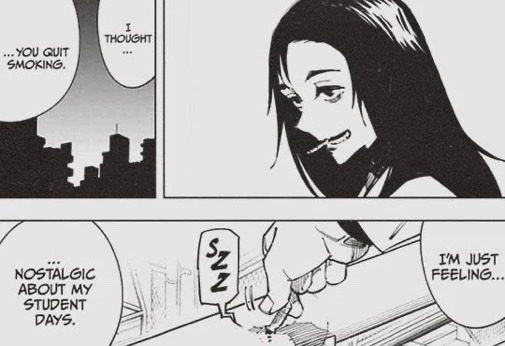
mind you this was after she and yaga learned satoru had been sealed. she heard the news and immediately began smoking. why? because shoko is a person who masks her emotions and she does it well. she’s not the type of woman to break down in tears. she’s going to hide it and instead light up a cigarette.
we saw this with her interaction with suguru. she acted very nonchalant about his defection and the massacre he committed on the village and his parents. but when we fast forward ten years and go to jjk0, it’s made abundantly clear that she still cares about him. during the meeting where yaga declares they’re going to kill suguru — i’m pretty sure his words were ‘exorcise the curse that is geto suguru’ or something along those lines — shoko leaves. she flat out walks out. and during the night parade of 100 demons, we have a moment where see the most emotion out of shoko that we have for the majority of the series. she’s angry. she’s hurt. she has these thoughts of something along the lines of like ‘you sure made a mess for us’ regarding suguru. and it’s especially prominent because it’s the first time we’ve ever seen her like this and only time. the closest we get to seeing that again is during the sukuna fight.
she literally cares so much but she’s just emotionally constipated and doesn’t know how to show it 😭 it’s an issue both she and satoru have. they deflect. they mask. they move on and yet the carry it with them somewhere deep inside them.
so we go back forward to satoru and sukuna’s fight. where we do see emotion from shoko but what’s most important to note is the panels she’s in. when they focus on her, she’s either smoking a cigarette, lighting a cigarette up, or we see her surrounded by cigarette butts.
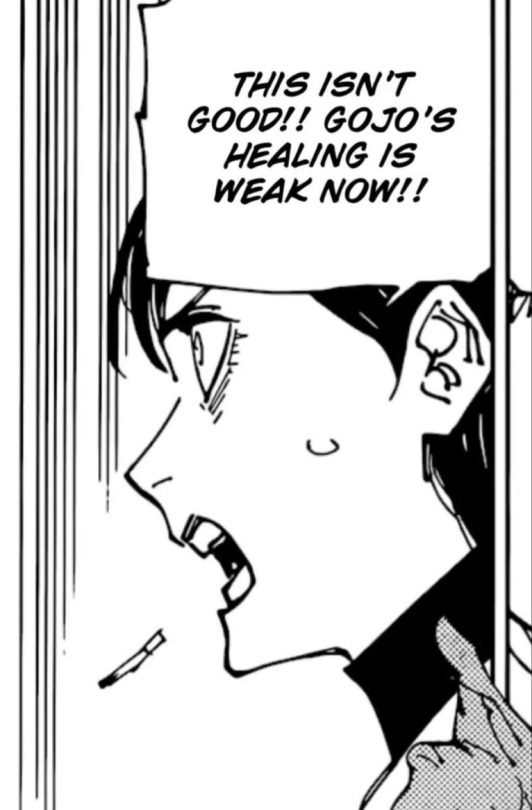
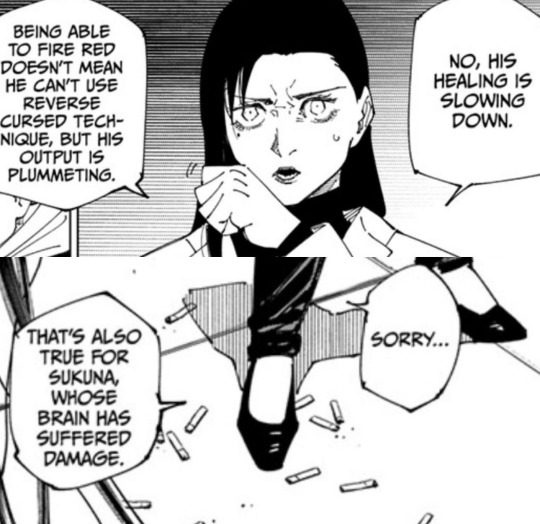
we see her genuinely fearful at this point. she had full confidence that satoru was going to win. that’s why she said ‘do what you want’ and didn’t object. because in her mind, it wouldn’t happen.
it’s very important to remember that sashisu, whether you see it in a romantic or platonic way, was a group that cared so fucking deeply for one another. their bonds were deep. their love for their found family was deep. it’s part of the reason why suguru defected in the end. which i can get it into but not at this time. but at the end of the day, sashisu had ass communication skills and failed to properly understand one another.
and that seems to continue on with the satoshoko side of that, which was left after suguru left. and after he died.
also, it’s really important to remember that shoko is not like satoru and suguru. she’s a healer. that’s it. that’s all she does. she doesn’t get to fight or be on the front lines like they do. she’s the one who gets to wait behind and wait until the damage is done to do her job. she’s been doing this since she was (probably) 15, maybe even younger since we don’t know her backstory. she’s going to be emotionally detached. also, keep in mind this page:
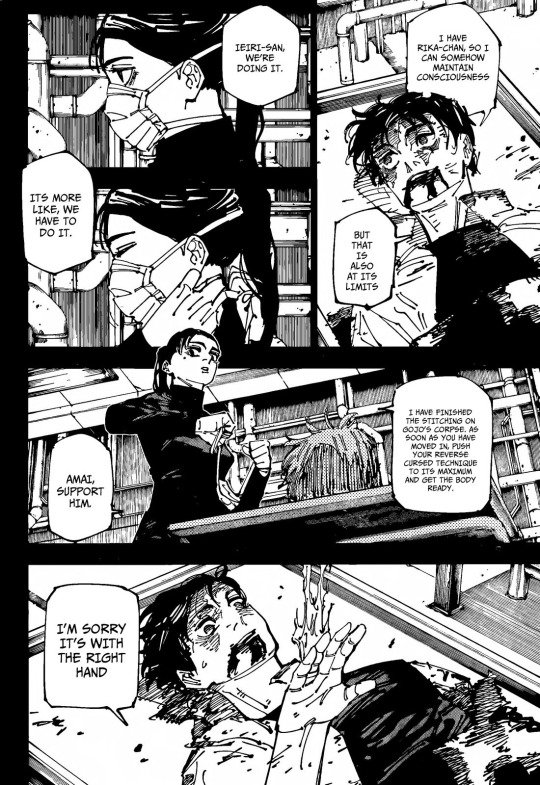
specifically her first piece of dialogue. ‘it’s more like we have to do it.’
and that’s the bottom line.
whew. this was rough. shoko ieiri you will always be loved by me.
#jujutsu kaisen#shoko ieiri#gojo satoru#geto suguru#sashisu#satoshoko#satosho#sugushoko#if you guys don’t understand shoko#you can just say that#but don’t villainize her#there’s inevitably going to be an aftermath#and we’ll see what happens then.#jjk 261#jjk spoilers#jujutsu kaisen spoilers#sabé is gnawing at the bars of their enclosure
725 notes
·
View notes